Category: Democracy
January 28th, 2017 by geoffhodgson1946

Geoffrey M. Hodgson
The political earthquakes of 2016 are probably the beginning of a series of major ruptures in world politics. Donald Trump was elected in the USA, Britons voted for Brexit, Turkey lurched toward dictatorship, Brazil ejected a democratically-elected president, Russia extended its global influence, and China tightened internal security while building military bases in the South China Sea.
From America to Asia, authoritarian nationalism is on the march. The future of old alliances is cast in doubt, raising a renewed spectre of global war.
These seismic changes should prompt us to reconsider our priorities. Is ‘neoliberalism’ – whatever that means – our main enemy? Or is it rising authoritarianism and nationalism instead?
We have been here before, albeit with much less dangerous military weapons. The rival imperialisms of the nineteenth century led to the First World War. Collapsing imperial dynasties triggered revolution in Central and Eastern Europe. Communists successfully seized power in Russia in 1917. Post-war political and economic turbulence led to the triumph of fascism in Italy, Germany and Spain. Imperial Japan invaded nationalist China.
I am not suggesting that history will repeat itself in the same way. But it is important to understand how the tectonic plates of political change affected the way we understand and map political positions, and the way in which we prioritise political issues.
The thirty-year squeeze (1918-1948)
Europe suffered economic depression for much of the interwar period. The financial crash of 1929 exacerbated the crisis and led to a collapse of world trade. Liberal defenders of the market economy were put on the defensive: capitalism seemed at the end of its tether.
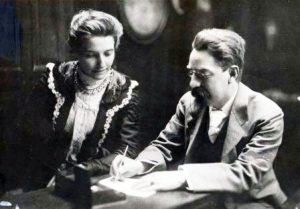
Beatrice & Sidney Webb
Meanwhile, some intellectuals from the USA and Britain – including Labour stalwarts George Bernard Shaw and Sidney and Beatrice Webb – visited the Soviet Union brought back glowing accounts of an expanding economy and a joyful population. (The Soviet propagandists explained away disasters such as the Ukranian Famine as resulting from sabotage by rich peasants or foreign agents.)
With the crisis of capitalism, the rise of fascism and the apparent success of Soviet Russia, many British and American radicals became Communists or fellow travellers. For them, liberalism and the defence of the market economy seemed a weak or unviable option.
The choice seemed to be between two forms of authoritarian government: much better the one that proclaimed equality and opposed racism. (But in reality, the Stalin regime promoted antisemitism, genocide against several other ethnic minorities, and dramatic internal inequalities of power.)
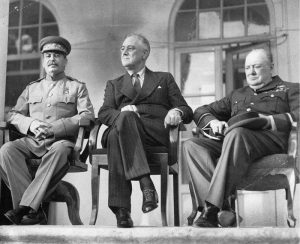
Stalin, Roosevelt and Churchill in 1941
The alliance between Russia and the West in the Second World War smothered criticism of what was really going on within Stalin’s regime. But, with the beginning of the Cold War in 1948, socialists were forced to make a choice between either supporting an antagonistic and undemocratic foreign power, or aligning with the USA and its allied democracies.
Labour under Clement Attlee aligned with the West. But rose-tinted visions of Soviet Russia or (from 1949) Mao’s China lived on among he Left.
In major European democracies, the thirty years between the end of the First World War and the start of the Cold War had seen liberalism squeezed, between socialism on the one hand, and reactionary authoritarianism on the other.
‘American imperialism’ and the rise of neoliberalism
Things were different in the USA, which polarised between forms of Republican conservatism and Democratic liberalism. But rising tensions in the Cold War, and the eruption of the Vietnam War in the 1960s, made American-style liberalism less attractive for the global Left.
 Marxist-led national liberation movements in Cuba, Indochina and elsewhere kept the collectivist vision alive for the Left around the world. Liberalism was see as the fake ideology of American imperialism and the global bourgeoisie.
Marxist-led national liberation movements in Cuba, Indochina and elsewhere kept the collectivist vision alive for the Left around the world. Liberalism was see as the fake ideology of American imperialism and the global bourgeoisie.
Some have argued that neoliberalism was reborn in the 1970s, when conservatives such as Ronald Reagan and Margaret Thatcher adopted a vision of expanding markets and a contracting state. Although the Left could never agree on what ‘neoliberalism’ meant, they mostly agreed that it was the main enemy.
Much of the Left, throughout the world, had never got rid of its agoraphobia – its fear of markets. Private enterprise and market forces were always and everywhere seen as the problem. Liberals, who defended private property and markets as well as human rights, were mocked as the bourgeois enemy.
Our brave new world
But the global tectonic plates are now shifting abruptly, in an erupting national and international crisis, as big as anything since 1948.
Nationalist leaders strut around the world stage. They stock up their nuclear and conventional arsenals and jostle for geopolitical advantage.
Torture is endorsed. Journalists are threatened or imprisoned. Scientific findings on climate change are denied. Intellectuals and experts are ridiculed. Ignorance and dogma are celebrated. Truth is swamped by lies. Legislation protecting workers and the poor is undone. Minorities are attacked and made scapegoats. Racism is given licence. People suffer discrimination on the basis of their religious or other beliefs. Democratic systems are damaged. Judges and lawyers are treated as traitors. The rule of law is undermined.
In this dangerous new world, it matters less whether that railway is nationalised or whether water distribution is in public ownership. Forms of ownership are always secondary to the actual provision and distribution of vital goods and services. But when our rights and liberties can no longer be taken for granted, questions over forms of ownership move even further down the ranking of priorities.
The ubiquitous, trivialising idea that the Left is defined in terms of public provision, and Right as private provision, is historically recent and a gross reversal of their original meanings. It is also a polarisation of lesser relevance in this world of rising authoritarian nationalism.
Our fundamental rights, our liberty, and the rule of law are now increasingly threatened. Their defence becomes the great struggle of our time.
This lesson is hardest for Americans and Britons, who were spared domestically from the jackboots of twentieth-century despotism. Struggles for British and American national liberty are beyond living memory. We have grown fat and lazy on the fruits of the liberal order. We have taken for granted its institutions and underestimated their fragility. We must repair our vigilance.
The liberal opportunity
For 100 years, for the reasons given above, liberalism has been marginalised. Now is its opportunity – indeed its urgent necessity.
Unlike our grandparents in the crisis-ridden 1930s, we have seen the socialist experiments of the twentieth century and counted their cost at 90 million lives. History and social science have more to teach us. If we wish to learn, we can know more about how markets work. We can understand the informational, organisational and other impediments to comprehensive national planning. We can appreciate why countervailing politico-economic power, based on a strong private sector, are necessary to buttress democracy and resist authoritarianism. The twentieth century has taught us these lessons.
The old Marxist mantra of bourgeoisie versus proletariat is also ungrounded in reality. Instead we have a highly fragmented working class, much of it enduringly aligned with authoritarianism and nationalism. Marxism relies on a quasi-religious and nonsensical belief that the working class – whatever it actually believes or strives for – carries our human destiny.
Class struggle has mattered, but it has never been the main motor of history. What have mattered more have been struggles for power, by individuals, dynasties, nations, religions or ideological movements.

The Storming of the Bastille in 1789
Liberalism was one of those movements. Based on the imperatives of equality and liberty, it matured in the Enlightenment.
Liberalism rose up in the English Civil War of the 1640s, in the American Revolution of the 1770s, and in the French Revolution of 1789, in titanic struggles against despotism and oppression.
Now, once again, liberalism is centre stage, as the enemy of authoritarian nationalism.
The liberal rainbow
Its allies are not those who pander to authoritarianism by eroding civil liberties, or do the spadework of the nationalist Right by making immigration (rather than assimilation) a foremost problem. The prime allies of liberalism are all those who defend liberty and human rights. But therein lies a concern, which must be discussed.
From the beginning, liberalism has harboured different views on the role of the state and of the degree of state intervention required in the economy and society. On the one hand there are liberals – sometimes called libertarians – who wish to minimise the role of the state.
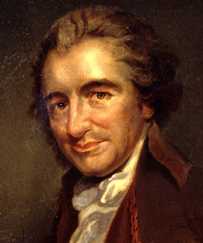
Thomas Paine
John Maynard Keynes – another great liberal – argued that state regulation of financial markets and counter-cyclical expenditures are necessary to stabilise the capitalist system. Keynes showed that economic austerity is a flawed doctrine. Government deficits are best reduced by growth: budget cuts can contract the entire economy and make the problem worse.
There is a spectrum of views between individualist and social-democratic liberalism, but all liberals are united in their defence of individual liberty, human rights and political democracy. The diverse colouring of this rainbow does not diminish its united opposition to the dark intolerance and division that is exacerbated by authoritarian nationalism.
The struggle for liberty and equality has always been vital. But many twentieth-century radicals were diverted by the delusions of socialism. The renewed rise of authoritarianism has shown us again that liberalism is the vital political movement of the modern age.
28 January 2017
Minor edits: 29 January, 1, 16 May 2017
|
This book by G. M. Hodgson elaborates on some of the political issues raised in this blog:
Wrong Turnings: How the Left Got Lost
Published by University of Chicago Press in January 2018
|
Bibliography
Allett, John (1981) New Liberalism: The Political Economy of J. A. Hobson (Toronto: University of Toronto Press).
Beveridge, William (1944) Full Employment in a Free Society (London: Constable).
Clarke, Peter (1978) Liberals and Social Democrats (Cambridge: Cambridge University Press).
Claeys, Gregory (1989) Thomas Paine: Social and Political Thought (London and New York: Routledge).
Courtois, Stéphane, Werth, Nicolas, Panné, Jean-Louis, Packowski, Andrzej, Bartošek, and Margolin, Jean-Louis (1999) The Black Book of Communism: Crimes, Terror, Repression (Cambridge MA: Harvard University Press).
Hodgson, Geoffrey M. (2015) Conceptualizing Capitalism: Institutions, Evolution, Future (Chicago: University of Chicago Press).
Hodgson, Geoffrey M. (2017) Wrong Turnings: How the Left Got Lost (Chicago: University of Chicago Press, forthcoming).
Keane, John (1995) Tom Paine: A Political Life (London: Bloomsbury).
Keynes, John Maynard (1936) The General Theory of Employment, Interest and Money (London: Macmillan).
McCloskey, Deirdre Nansen (2017) ‘Nationalism and Socialism Are Very Bad Ideas: But liberalism is a good one’, Reason.Com, February. http://reason.com/archives/2017/01/26/three-big-ideas
Monbiot, George (2016) ‘Neoliberalism – the ideology at the root of all our problems’, The Guardian, 15 April. https://www.theguardian.com/books/2016/apr/15/neoliberalism-ideology-problem-george-monbiot.
Townshend, Jules (1990) J. A. Hobson (Manchester: Manchester University Press).
Venugopal, Rajesh (2015) ‘Neoliberalism as a Concept’, Economy and Society, 44(2), pp. 165-87. http://www.tandfonline.com/doi/abs/10.1080/03085147.2015.1013356.
Posted in Brexit, Common ownership, Democracy, Donald Trump, Immigration, Karl Marx, Labour Party, Left politics, Liberalism, Markets, Nationalization, Politics, Populism, Private enterprise, Right politics, Socialism
December 6th, 2016 by geoffhodgson1946

Geoffrey M. Hodgson
Racist nationalism has returned from the fringes to mainstream politics. In 2016 it played a major role in the Brexit vote in the UK, in the election of Donald Trump in the US, in the presidential election in Austria, and in developments in many other countries.
Racism and other forms of discrimination, including by gender or belief, must be defeated. The Left has played a major role in countering racism, and it should be give due credit for that. But in some other respects the Left on this issue is weak and misguided.
Some things we cannot talk about – but we must
Some things have become difficult to discuss. I once tweeted the (obviously true) statement that “Islam is religion, not a race”. A fellow tweeter immediately assumed that I was some kind of bigot and responded “ugh!”
In this reactive climate it has become difficult to raise concerns about (say) Sharia law without being branded racist or right-wing. Discussion ends. But the fact that rightist bigots – such as Nigel Farage and Geert Wilders – go on about Sharia law does not mean that we cannot discuss it.
 Of course, Muslims and others suffer significant discrimination, in Britain and elsewhere. In recent months, Trump has been responsible for major anti-Muslim outbursts and has whipped up violent anti-Muslim sentiment in the US.
Of course, Muslims and others suffer significant discrimination, in Britain and elsewhere. In recent months, Trump has been responsible for major anti-Muslim outbursts and has whipped up violent anti-Muslim sentiment in the US.
We must defend the full human rights of everyone, including members of all faiths. But this does not mean that we must refrain from criticising religious doctrines.
On the contrary, our failure to discuss these issues has favoured conservatives over reformers within these religions, has allowed religious extremism to ferment, and has repeatedly played into the hands of the reactionary and extremist Right.
I explain here where and how the Left has got things wrong in this area. I concentrate mostly on the moderate Left. The sins of many on the Far Left are much worse, including their support for fanatical, religious, “anti-Imperialist”, extremists in Palestine, Iran and elsewhere.
The election of Trump is a wake-up call. We need to find more effective ways to counter racism and other forms of discrimination. We need to find ways to make multi-religious and multi-ethnic communities more inclusive and cohesive.
Immigration – beyond the numbers game
The recent massive increases of immigration into Europe and elsewhere are a fact. But at least as far as the UK is concerned, it has been shown that the economic benefits of immigration are positive.
 But much of the political debate is about immigrant numbers. The Tories ignore the economic evidence and start a Dutch auction of targets, to stem numbers. A large part of the Labour Party, facing a seepage of its working class support to UKIP, moves in a similar direction.
But much of the political debate is about immigrant numbers. The Tories ignore the economic evidence and start a Dutch auction of targets, to stem numbers. A large part of the Labour Party, facing a seepage of its working class support to UKIP, moves in a similar direction.
Of course, mass immigration becomes a problem when there are not enough school places, health services are severely stretched, housing is limited and inadequate, and the transport infrastructure groans from decades of under-investment.
Labour is internally divided between those that want to restrict immigration, and the leadership around Jeremy Corbyn who propose no restrictions at all. With some notable exceptions, what is missing is a discussion prioritising assimilation.
The Casey Review

Louise Casey
The recently-published, government-commissioned report by Louise Casey suggests that “the tough questions on social integration are being ducked”. Casey and her team found evidence that black and minority ethnic groups are still suffering from discrimination and disadvantage and responses by government and others are inadequate. While she found some evidence of integration, in other areas the outcomes were different:
“In some council wards, as many as 85% of the population come from a single minority background, and most of these high minority concentrations are deprived Pakistani or Bangladeshi heritage communities.”
These concentrated enclaves are more difficult to assimilate and create particular problems for women:
“this sense of retreat and retrenchment can sometimes go hand in hand with deeply regressive religious and cultural practices, especially when it comes to women. These practices are preventing women from playing a full part in society, contrary to our common British values, institutions and indeed, in some cases, our laws. … I’ve met far too many women suffering the effects of misogyny and domestic abuse, women being subjugated by their husbands and extended families. Often, the victims are foreign-born brides brought to Britain via arranged marriages. They have poor English, little education, low confidence, and are reliant on their husbands for their income and immigration status. They don’t know about their rights, or how to access support, and struggle to prepare their children effectively for school.”
Casey argued that fears of being labelled “racist” have prevented society from challenging sexist, misogynistic and patriarchal behaviour in some minority communities. Her report cites claims that some Sharia councils had supported the values of extremists, condoned wife-beating, ignored marital rape and allowed forced marriages.
Her report concluded with a rallying cry:
“The problem has not been a lack of knowledge but a failure of collective, consistent and persistent will to do something about it or give it the priority it deserves at both a national and local level.”
But to “do something about it” requires a clearer understanding of the problems involved and what kind of policies are needed to deal with them. Some people have criticised Casey’s empirical claims and more research is clearly required.
Multiculturalism
As several authors have pointed out, multiculturalism is an ambiguous concept. In one sense, at least, it is unobjectionable. All civilisations have drawn and benefitted from cultural variety. Western countries today benefit enormously from the influx of ideas, skills, fashions, cuisines and experiences that successive waves of immigration have brought. This has been true for millennia. It is no less true today.
Institutions are the stuff of society: institutions are systems of social rules. Some rules – concerning dress and fashion for example – can change profoundly without social collapse.
Other institutions – particularly in law and politics – are the outcomes of centuries of experience, deliberation and experimentation. We cannot put these in a culture-mixing food blender without tearing apart the fabric of society and wrecking social cohesion and solidarity.
Much discourse about multiculturalism ignores these differences in types of rules and institutions. Everything is placed under the vague and overly-capacious category of “culture”, assuming everything can be mixed at will. This soup-making, food-blender approach is dangerous and misconceived.
Cultural relativism
Some parts of the Left have embraced normative cultural relativism. This is the view that one person’s morality is as good as any other. It is said that there is no “objective” or “correct” morality. No overriding importance is given to democracy or to the United Nations Declaration of Universal Human Rights. Other cultures have different codes and priorities: let them be.
According to this view, asking people from other cultures to adopt our over-arching laws and values is seen as a manifestation of “oppression” or “Western imperialism”. We have to be very careful not to jump to the conclusion that Western moral values are superior. But that does not mean that we should reach no judgmental conclusion at all.

Germaine Greer
For example, in her 1999 book The Whole Woman, the self-declared “Marxist” and iconic feminist Germaine Greer asked us to refrain from criticising female genital mutilation, on the grounds that it would impose our cultural values on others.
In his excellent book What’s Left? Nick Cohen gives some further examples of highly misguided cultural relativism, including attempts by feminists and leftists to defend the Indian practice of burning widows alive after the deaths of their husbands.
Analytically, this kind of cultural relativism has major flaws. First, it falls down in dealing with changing attitudes through time in one country. A cultural relativist, time travelling back to 1800, could raise no objection to slavery, or to the lack of women’s rights. If one morality is as good as any other, then there can be no moral force for change.
Second, it is internally inconsistent. Cultural relativism denies that our values are valid or suitable for other cultures. Why should this normative claim (that we should not impose our normative values on other cultures) be adopted by others in different cultures? By the logic of cultural relativism, thinkers in other cultures are not obliged to be cultural relativists. The whole argument is self-defeating.
Third, cultural relativism degrades the role of morality, by treating it as a matter of individual preference. The whole point about morality is that it transcends individual preferences. Moral claims (be they right or wrong) are universal. Humans have developed systems of morality to provide us with rules that help social cohesion while simultaneously protecting individual rights and liberties.
Reticence to act – condemnation of action
As well as the benefits of cultural enrichment, mass immigration has also brought problems of assimilation. In the UK there are large communities where many people do not speak English, or remain ignorant of prevailing laws and values that have evolved over centuries to keep our society together and to protect our interests.
Many of these immigrants had limited experience of any Western-style democracy and had an inadequate appreciation of universal human rights. Many came from rural areas in undeveloped countries, where the state was weak and social and business interactions were governed by custom and religion, based on ties of loyalty to family and clan.

Ann Cryer
Faced with this issue, many progressive politicians have adopted a stance of ultra-tolerance and inaction. Consider the question of language. Should immigrants be obliged to learn the language of their new country, so that they can understand its culture and its laws? Some other countries take this on board.
But such an assimilationist policy in the UK was highly controversial as late as 2001. In that year, the Labour MP Ann Cryer bravely argued that many Muslims were held back economically and educationally by language difficulties. The problem was especially severe among Muslim women.
But she was faced with criticism and scorn from the Left. Shahid Malik, then a senior member of the Commission for Racial Equality and of the Labour Party National Executive Committee, and subsequently a Labour MP and government minister, responded to Cryer: “Her arguments are sinister and they have no basis in fact … she is doing the work of the extreme right wing.”
Promoting faith schools
Schooling must be central to any viable integration programme. Young people need to learn about the struggles for democracy, independence, rights and human emancipation, throughout the world. They should be free to discuss and evaluate all these things.
Such a broad education is less likely in a school that is linked to one particular religion. Instead it would be more viable in secular schools with pupils from multiple religions, classes and cultures. Broad-based secular education is even more vital in multi-cultural and multi-faith societies.
 After coming to power in 1997, Labour Prime Minister Tony Blair promoted a programme of expansion of faith schools. But a 2001 report commissioned by Bradford City Council concluded that its communities were becoming increasingly isolated along racial, cultural and religious lines, and that faith-segregated schools were fuelling the divisions.
After coming to power in 1997, Labour Prime Minister Tony Blair promoted a programme of expansion of faith schools. But a 2001 report commissioned by Bradford City Council concluded that its communities were becoming increasingly isolated along racial, cultural and religious lines, and that faith-segregated schools were fuelling the divisions.
In 2001 there were riots in Bradford, which spread to other northern cities. Yet in the same year the Labour Government proposed a large increase in the number of state schools run by religious organizations.
By 2002 there was a major public row, with accusations that some pupils were being taught creationism in and that homosexual acts are against God’s law. Campaigners for women’s rights expressed concern that conservative religious teachers were instructing young girls that women should take a secondary role in society.
Despite his previous opposition to Blair, in 2016 the Labour Leader Jeremy Corbyn expressed his support for faith schools. No major UK political party has dared to come out against them. They are being vigorously promoted by the current Conservative government.
Faith schools have hindered assimilation

David Bell
David Bell warned in a January 2005 speech to the Hansard Society – when he was Chief Inspector of Schools – that a traditional Islamic education did not equip Muslim children for living in modern Britain. He said: “I worry that many young people are being educated in faith-based schools, with little appreciation of their wider responsibilities and obligations to British society.” He continued:
“We must not allow our recognition of diversity to become apathy in the face of any challenge to our coherence as a nation … I would go further and say that an awareness of our common heritage as British citizens, equal under the law, should enable us to assert with confidence that we are intolerant of intolerance, illiberalism and attitudes and values that demean the place of certain sections of our community, be they women or people living in non-traditional relationships.”
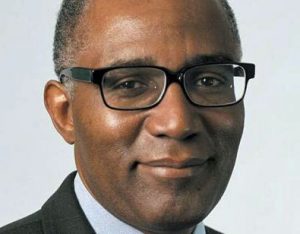
Trevor Phillips
His comments were condemned as “irresponsible” and “derogatory” by some senior Muslims, but supported by Trevor Phillips, then chair of the Commission for Racial Equality.
In another lecture Bell said: “We can choose … whether we want to bring our diversity together in a single rainbow or whether we allow our differences to fester into separate cultures and separate communities.”
Phillips came to the conclusion that increasing self-segregation of British communities along ethnic and religious lines was a major threat to national integration and to Enlightenment values. Young people were being brought up with insufficient awareness of these values, in closed communities where extremism could fester.

David Miliband
Ken Livingstone, then Mayor of London, attacked Phillips for “pandering to the right”. During a televised discussion, the prominent Labour Minister David Miliband shook his head and described Phillips’s remarks about community segregation as “fatuous”.
Since then, Phillips’s concerns about social segregation in British communities have been vindicated by several experts, while other evidence indicates a small amount of progress. Even the most optimistic reading of the evidence suggests a serious and enduring problem.
On faith schools, the Casey report noted their role in institutionalising segregation:
“The Government had attempted to alter the segregation of pupils in faith schools by introducing admissions criteria for new faith-based Free Schools. But these did not seem to be having an impact on the diversity of minority faith schools … [their] admission policies do seem to play a role in reinforcing ethnic concentrations.”
But Casey did not take the final step. She wrote: “ending state support for all faith schools would be disproportionate”. But how serious do the problems have to become before it becomes proportionate?
Rather than relying on failed palliatives, state-funded faith schools should be phased out. Taxpayers should not subsidise religion: religion and the state should part company.
A recent poll found that an overwhelming majority of the British public opposed religious discrimination in faith school admissions. Making all faith schools non-discriminatory in terms of religion would be a big positive step.
Fostering extremism
Ed Husain was born and educated in Britain, where he obtained a Master’s Degree. He was drawn toward extreme versions of Islam and was persuaded that Western democracies are irredeemably corrupt and must be replaced by a theocracies based on Islamic law.
 After several years he renounced his former extremism, but retained his Islamic faith. In an interview he revealed the segregated life of his upbringing:
After several years he renounced his former extremism, but retained his Islamic faith. In an interview he revealed the segregated life of his upbringing:
“The result of 25 years of multiculturalism has not been multicultural communities. It has been mono-cultural communities. Islamic communities are segregated. Many Muslims want to live apart from mainstream British society; official government policy has helped them do so. I grew up without any white friends. My school was almost entirely Muslim. I had almost no direct experience of ‘British life’ or ‘British institutions’.” (Quoted in Cohen 2007, p. 378.)
British policy-makers have welcomed diversity. But they have defined needs and rights via the ethnic categories into which people were placed, using those divisions to shape public policy. The result has been a more fragmented society, which has nurtured extremism.
In the name of multi-culturalism, Britain has become a more divided society, where inclusive, universal, Enlightenment values are often side-lined or unknown. These communal enclaves, found in France and Belgium as well as Britain, have become hothouses for violent extremism.
Hassan Butt was born in Luton in England in 1980. In 2000 he travelled to Pakistan and worked for the Taliban and other jihadists against the West. Subsequently he renounced his anti-Western views.
Butt explained that “Islamic theology, unlike Christian theology, does not allow for the separation of the state and religion … [they] are considered to be one and the same.” Consequently, since there no righteous Islamic state is deemed to exist, the extremists have “declared war on the whole world”.
 Some on the Far Left disowned Butt for betraying the struggle against “Western imperialism”. He was also criticized by one member of the “Stop the War” movement, who is a leading supporter of the Muslim Brotherhood, for his “call to change the face of Islam” (Cohen 2007, pp. 371-2).
Some on the Far Left disowned Butt for betraying the struggle against “Western imperialism”. He was also criticized by one member of the “Stop the War” movement, who is a leading supporter of the Muslim Brotherhood, for his “call to change the face of Islam” (Cohen 2007, pp. 371-2).
Butt’s response was clear: “I believe that the issue of terrorism can be easily demystified if Muslims and non-Muslims start openly to discuss the ideas that fuel terrorism.” However, many on the Left, as well as the Right, are not helping this process.
British values?
Successive British Prime Ministers have reacted to the threat of Islamist extremism by calling for “British values”. After claims that some schools in Birmingham were promoting Islamist extremism, in 2014 the Conservative Prime Minister David Cameron outlined plans to put the promotion of “British values” at the heart of the national curriculum for schools. This is now official policy:
“Schools should promote the fundamental British values of democracy, the rule of law, individual liberty, and mutual respect and tolerance of those with different faiths and beliefs.”
 But the official government document outlining this policy mentions respect and tolerance for other races but fails to mention discrimination against women or gays. It rightly mentions the freedom to “choose and hold” any faith, but not the freedom to exit a religion without sanction. It mentions “individual liberty” only once, and fails to uphold freedom of non-violent expression, including when it may cause offence.
But the official government document outlining this policy mentions respect and tolerance for other races but fails to mention discrimination against women or gays. It rightly mentions the freedom to “choose and hold” any faith, but not the freedom to exit a religion without sanction. It mentions “individual liberty” only once, and fails to uphold freedom of non-violent expression, including when it may cause offence.
Are these omissions an accident, or are they designed not to offend a particular religious minority?
 Another problem here is not the values as such, but their nationalistic description as “British”. Democracy was not invented in Britain: Ancient Athens and Viking Iceland have much earlier precursors. The US and France have much earlier claims to the values of liberty and religious tolerance. Britain legally discriminated against Protestant nonconformists and Catholics until the nineteenth century, and it still bars any Catholic from becoming its sovereign.
Another problem here is not the values as such, but their nationalistic description as “British”. Democracy was not invented in Britain: Ancient Athens and Viking Iceland have much earlier precursors. The US and France have much earlier claims to the values of liberty and religious tolerance. Britain legally discriminated against Protestant nonconformists and Catholics until the nineteenth century, and it still bars any Catholic from becoming its sovereign.
Apart from being misleading and inaccurate, the label of “British values” would hardly be effective in preventing a young Muslim from being radicalised. On the contrary, the label can help bolster the misperception that Britain and the rest of the West are at war against Islam. This nationalistic labelling readily allows the distortion that “British values” are being promoted by the UK authorities in a global effort to counter Islam.
It would be more accurate and effective to label values such as democracy, the rule of law, individual liberty, and freedom of worship as “universal values” or “Enlightenment values”. They are not simply values that British residents and citizens should adopt. Other countries should promote these values too.
Islamophobia?
Polly Toynbee is a leading progressive, and vigilantly anti-racist, British journalist. Yet in 2004 she was proclaimed by the Islamic Human Rights Commission as the winner of their “Most Islamophobic Media Personality” award.

Polly Toynbee
In her words, she received this ridiculous appellation because she “had challenged the legitimacy of the idea of Islamophobia and warned of the danger to free speech of trying to make criticism of a religion a crime akin to racism.” She rightly noted that the “occasional note of reason from moderate Islamic groups is so weak it hardly makes itself heard”. She highlighted the difficulties involved in starting a serious dialogue on this issue.
The failure to distinguish racism from criticism of religion sadly remains widespread. Many on the Left have done excellent work since the 1970s in campaigning against racism, fascism and discrimination. But the frequent confusion of criticism of religion with racism has diverted their efforts.
It must be repeated that concerns about Islam as a belief system are not equivalent to bigotry toward Muslims. Racism and persecution of Muslims are serious problems and should be vigilantly opposed. But the option to criticise Islam, or any other belief system, is an important right, and it should be protected.
The term “Islamophobia” is partly to blame. Despite widespread usage, it is rarely defined and there is no consensus on its definition.
Does it literally mean fear of Islam? Or criticism of Islam? Or hatred of Islam? Or persecution of Muslims? Its intended meaning can range from scholarly criticism of Islamic doctrines to racist acts against ethnic groups who are Muslim. These are obviously very different. Yet they are all lumped together under the same label.
“Anti-Muslim prejudice” or “anti-Muslim discrimination” would be much better terms. They accurately describe this very real and sadly widespread problem.
Criticism of religion can be enlightening – indeed a part of Enlightenment (and British) values, from Voltaire to Bertrand Russell. We should also be free to criticise Sharia law, as we are free to criticise other laws.

Justin Welby
As Archbishop of Canterbury Justin Welby pointed out recently, there also needs to be a discussion about the doctrinal links between religion and extremism:
“This requires a move away from the argument that has become increasingly popular, which is to say that ISIS is nothing to do with Islam, or that Christian militia in the Central African Republic are nothing to do with Christianity, or Hindu nationalist persecution of Christians in South India is nothing to do with Hinduism.”
Extreme and draconian statements can be found in the Old Testament of the Bible as well as in the Qur’an. Believing that they are obeying the word of God, these texts have spurred violent religious extremists, as we are all sadly aware.
Nevertheless, many modern Christians, Jews and Muslims have accepted the power of state law over religious law. They obey the laws of their country. They do not kill homosexuals (Leviticus 20:13), or slay apostates (Deuteronomy 13:6-10), or stone to death a bride who is not a virgin (Deuteronomy 22:20-21), or rape non-Muslim women (Qur’an 23:1-6, 70:22-30), or make war on unbelievers (Qur’an 8:12, 9:5, 9:73, 9:123).
We must help this vital transition from regressive religious law, toward a recognition of modern secular law and democracy. But we do not do so by pretending it is not needed, or refusing to discuss it, or branding those that discuss it as “Islamophobic”.
Signs of hope
On a more positive note, the authors of the 2007 Policy Exchange Report argued for a change of approach. The government and others “should stop emphasising difference and engage with Muslims as citizens”.
Policies of “group rights or representation” for specific Islamic communities are likely to alienate other sections of the Muslim population further. These well-informed remarks went against much of the then-current local and national government policy.
The authors continued: “The exaggeration of Islamophobia does not make Muslims feel protected but instead reinforces feelings of victimisation and alienation.” They also called for “a broader intellectual debate in order to challenge the crude anti-Western, anti-British ideas that dominate cultural and intellectual life. This means allowing free speech and debate, even when it causes offence to some minority groups.”
We need to be honest. Extremist religions of all kinds can threaten liberal, democratic and Enlightenment values. Christianity in particular has been violently repressive and brutal. Some religious sects today are fanatical and intolerant.
These issues need to be openly discussed, in a civilised manner. They should not be swept under the carpet by those on the Regressive Left who act as if they do not understand the difference between race and religion, or would shut down critical discussion of a religion because it might be wrongly construed by others as an attack on a minority, or by other politicians of any stripe who are simply too scared to take the issue on.
In an immensely positive development, the “Muslim Reform Movement” was launched in 2015. In their inaugural statement they defended freedom of speech, gender equality, a secular state and the UN Declaration of Universal Human Rights. They noted explicitly that freedom of speech included the right to criticize Islam: “Ideas do not have rights. Human beings have rights.”
By contrast, the blanket and ill-defined leftist rhetoric of “Islamophobia” does not help those Muslims who are struggling to reform and modernise their religion. Instead, the more conservative leaders of Muslim communities protect their regressive and reactionary views behind its smokescreen. Modernising Muslims are thus impaired by an unwitting coalition of leftists and Muslim conservatives.
Responsibility lies on both sides. In a climate of open discussion, we all need to be vigilant against acts of hatred or violence against Muslims and other minorities.
Initiatives to preserve liberal values in a multi-faith and multi-ethnic world should be welcomed. In addition, the Left needs to re-establish its links with the Enlightenment and its project to separate church from state. Within any society, freedom of worship should be protected, as well as the freedom to criticise religion.
Inward-looking, unreforming, dogmatic religion is a major barrier to assimilation. The Left needs to learn that lesson, and to encourage open discussion of the issues involved.

6 December 2016
Edited 7th and 10th December 2016, with thanks to Andrew Ross. Further edit, 23 January 2017.
|
My forthcoming book elaborates on some of the political issues raised in this blog:
Wrong Turnings: How the Left Got Lost
To be published by University of Chicago Press in November 2017
|
References
Accord Coalition (2016) ‘Public overwhelmingly opposes religious discrimination in faith school admissions’, Accord, 2 November. http://accordcoalition.org.uk/2016/11/02/public-overwhelmingly-opposes-religious-discrimination-in-faith-school-admissions/
Asthana, Anushka and Nazia Parveen (2016) ‘Call for action to tackle growing ethnic segregation across UK’, The Gaurdian, 1 November. https://www.theguardian.com/society/2016/nov/01/call-for-action-to-tackle-growing-ethnic-segregation-across-uk
Asthana, Anushka and Peter Walker (2016) ‘Casey review raises alarm over social integration in the UK’, The Guardian, 5 December. https://www.theguardian.com/world/2016/dec/04/social-integration-louise-casey-uk-report-condemns-failings
BBC News (2001) ‘MP calls for English tests for immigrants’, 17 July. http://news.bbc.co.uk/1/hi/uk/1436867.stm
Bell, David (2005) ‘Full Text of David Bell’s Speech’, The Guardian, 17 January. http://www.theguardian.com/education/2005/jan/17/faithschools.schools
Board of Deputies of British Jews (2016) ‘Board of Deputies statement on meeting with Leader of the Opposition Jeremy Corbyn’, 9 February. https://www.bod.org.uk/board-of-deputies-statement-on-meeting-with-leader-of-the-opposition-jeremy-corbyn/
Butt, Hassan (2007) ‘My plea to fellow Muslims: You must renounce terror’, The Observer, 1 July. http://www.theguardian.com/commentisfree/2007/jul/01/comment.religion1
Casey, Louise (2016) ‘The tough questions on social integration are being ducked’, The Observer, 4 December. https://www.theguardian.com/commentisfree/2016/dec/04/tough-questions-social-integration-laws-values-every-person-britain
Cohen, Nick (2007) What’s Left? How the Left Lost its Way (London and New York: Harper).
Department of Education (2014) Promoting Fundamental British Values as Part of SMSC in Schools (London: Department of Education). https://www.gov.uk/government/uploads/system/uploads/attachment_data/file/380595/SMSC_Guidance_Maintained_Schools.pdf
Department for Communities and Local Government (2016) The Casey Review: A review into opportunity and integration (London: Department for Communities and Local Government). https://www.gov.uk/government/uploads/system/uploads/attachment_data/file/574565/The_Casey_Review.pdf
Dobson, Roger (2014) ‘British Muslims face Worst Job Discrimination of any Minority Group, According to Research’, The Independent, 30 November. http://www.independent.co.uk/news/uk/home-news/british-muslims-face-worst-job-discrimination-of-any-minority-group-9893211.html
Gillard, Derek (2007) Never Mind the Evidence: Blair’s Obsession with Faith Schools www.educationengland.org.uk/articles/26blairfaith.html
Greer, Germaine (1999) The Whole Woman (New York: Doubleday).
Hodgson, Geoffrey M. (2017) Wrong Turnings: How the Left Got Lost (Chicago: University of Chicago Press, forthcoming).
Husain, Ed (2007) The Islamist: Why I Joined Radical Islam in Britain, What I Saw Inside, and Why I Left (London Allan Lane).
Hussain, Dilly (2015) ‘How “British Values” are used as a Smoke Screen for Anti-Muslim Government Policies’, Stop the War Coalition, 15 June. Formerly http://www.stopwar.org.uk/news/how-british-values-are-used-as-a-smokescreen-for-anti-muslim-government-policies. Now unavailable.
Kinnock, Stephen (2016) ‘How to build an inclusive and patriotic view of Britishness’, Labour List, 2 December. https://labourlist.org/2016/12/kinnock-how-to-build-an-inclusive-patriotic-and-confident-view-of-britishness/
Malik, Kenan (2005) ‘The Islamophobia Myth’, Prospect, February. http://www.kenanmalik.com/essays/prospect_islamophobia.html
Mirza, Munira, Senthilkumaran, Abi and Ja’far, Zein (2007) Living apart Together: British Muslims and the Paradox of Multiculturalism (London: Policy Exchange), https://policyexchange.org.uk/publication/living-apart-together-british-muslims-and-the-paradox-of-multiculturalism
Mortimer, Caroline (2016) ‘Justin Welby: It’s time to stop saying Isis has ‘nothing to do with Islam’”, The Independent, 19 November. http://www.independent.co.uk/news/people/isis-nothing-to-do-with-islam-justin-welby-archbishop-canterbury-religion-a7427096.html
National Secular Society (2015c) ‘Muslim Reform Movement Embraces Secularism and Universal Human Rights’, National Secular Society, 8 December. http://www.secularism.org.uk/news/2015/12/muslim-reform-movement-embraces-secularism-and-universal-human-rights
Portes, Jonathan (2012) ‘Inching towards integration?, National Institute of Economic and Social Research, 5 March. http://www.niesr.ac.uk/blog/inching-towards-integration#.WEglE01vicx
Sides, John (2015) ‘New research shows that French Muslims experience extraordinary discrimination in the job market’, The Washington Post, 23 November. https://www.washingtonpost.com/news/monkey-cage/wp/2015/11/23/new-research-shows-that-french-muslims-experience-extraordinary-discrimination-in-the-job-market/
Toynbee, Polly (2004) ‘We Must be Free to Criticise without Being Called Racist’, The Guardian, 18 August. http://www.theguardian.com/world/2004/aug/18/religion.politics
Travis, Alan (2016) ‘Mass EU migration into Britain is actually good news for UK economy’, The Guardian, 18 February. https://www.theguardian.com/uk-news/2016/feb/18/mass-eu-migration-into-britain-is-actually-good-news-for-uk-economy
White, Michael (2015) ‘Trevor Phillips says the Unsayable about Race and Multiculturalism’, The Guardian, 16 March 2015. http://www.theguardian.com/uk-news/2015/mar/16/trevor-phillips-race-multiculturalism-blog
Posted in Assimilation, Christianity, Democracy, Donald Trump, Immigration, Islam, Judaism, Labour Party, Left politics, Liberalism, Populism, Religion, Right politics
September 16th, 2016 by geoffhodgson1946
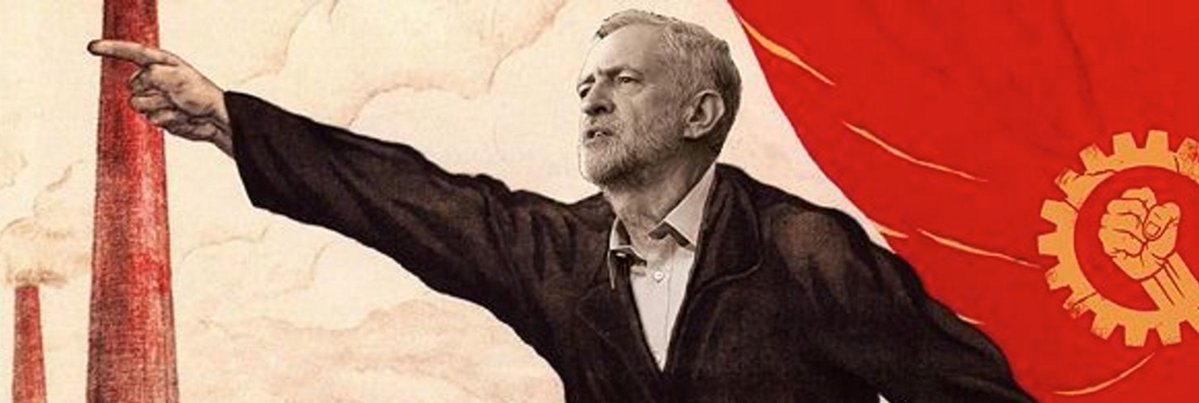
Geoffrey M. Hodgson
There are several different kinds of populism, emanating from both the left and right. But they have in common a view that some powerful minority group are clearly to blame for the ills suffered by a majority. As Julian Baggini put it, in his excellent article on Corbyn’s populism:
‘Populism is … a way of doing politics that has three key features. First, it has a disdain for elites and experts of all kinds, especially political ones. Second, it supposes that the purpose of politics is simply to put into action the will of the people, who are seen as homogenous and united in their goals. Third, it proposes straightforward, simple solutions to what are in fact complex problems.’
Rather than enter into a discussion over political problems and details, populists accuse those who fail to support them as collaborators of the exploiting elite. They believe that the elite is the main obstacle to progress, and solutions will appear once the elite is removed. They are suspicious of experts and dissenters. They are typically vague about their own objectives: their primary aim is to unite the bulk of the population behind a leader, against the elite.
The Great Crash of 2008 undermined confidence in existing elites. For this and other reasons, populism is now on the rise, in both Europe and the USA.
Populism on the Right
The campaign by UKIP to quit the European Union was populism incarnate. Its leader, Nigel Farage, complained frequently that the elites have gained too much power over hard-working ordinary people. Furthermore, elites at the national level had allegedly handed over power to unaccountable rulers in Europe, who have allowed mass immigration and robbed the UK of its sovereignty.
Because of his focus on a nationalist solution, and his identification of foreigners as a primary problem, Farage is an example of a right populist. By championing ‘ordinary British people’ against the establishment, and relying more on sentiment than on reasoned argument or expert advice, he is populist to the core.
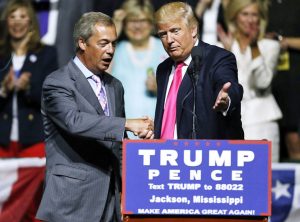 After his success in the Brexit referendum, Farage flew across the Atlantic to show his support for Donald Trump. At his August 2016 speech at a Donald Trump rally in Mississippi, Farage celebrated that Britain ‘chose not to be ruled by unelected old men in Brussels’. He drew parallels between the US and Britain, saying ordinary people everywhere had been ‘let down by government’. He was greeted by rapturous applause.
After his success in the Brexit referendum, Farage flew across the Atlantic to show his support for Donald Trump. At his August 2016 speech at a Donald Trump rally in Mississippi, Farage celebrated that Britain ‘chose not to be ruled by unelected old men in Brussels’. He drew parallels between the US and Britain, saying ordinary people everywhere had been ‘let down by government’. He was greeted by rapturous applause.
Trump’s rhetoric has much in common with that of Farage. Both blame immigrants for the problems in the country. Trump adds his rabid hostility to Muslims.
Corbynism as Left Populism
There are important differences between populists on the left and right. Left populists place less emphasis on the role of immigrants or foreigners: they are more inclusionary. Left populists also tend to favour greater state involvement in the economy. But elements of right populism can find their way into left movements, and vice versa.
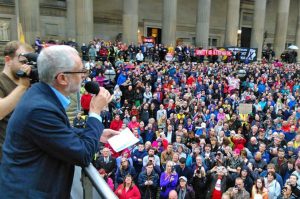 Jeremy Corbyn is very different from Nigel Farage and Donald Trump. Corbyn is neither a racist nor a misogynist (although he has shared political platforms with homophobes and anti-Semites). But Corbynism as a movement has strong populist features.
Jeremy Corbyn is very different from Nigel Farage and Donald Trump. Corbyn is neither a racist nor a misogynist (although he has shared political platforms with homophobes and anti-Semites). But Corbynism as a movement has strong populist features.
Other prominent examples of left populist movements include Syriza in Greece, Podemos in Spain and the ‘socialist’ regime established by the late President Hugo Chávez in Venezuela.
Labour has always been more pragmatic than ideological. Although Corbyn has some Marxist theoreticians close to him, including within his Momentum Praetorian Guard, he has relied much more on populist sentiment rather than Marxist theory.
The recent growth of left populism has been triggered by the crisis within social democracy, the disastrous invasion of Iraq in 2003, increasing economic inequality within leading economies, unaffordable housing, cuts in the welfare state and high rates of unemployment, especially among the young.
Corbynism vaguely promotes ‘socialism’, but there is no apparent agreement on what this means. There is a general suspicion of private enterprise, as well as a justified concern about the excessive power of some large corporations. When difficulties appear, public ownership is typically seen as the simple and obvious cure.
Like all populists, Corbyn rails against the elite. For him it is the rich minority and the large corporations. Like Farage, he identifies an elite that is bolstered by powerful friends abroad. But for Corbyn the most important foreign allies of the despised British elite are in Washington DC. With its anti-West foreign policy, Corbynism is Marxism-Leninism in populist clothing.
Corbynism Undermines Parliamentary Democracy
To public ownership is added the populist Corbynista slogans of ‘democratic control’ or ‘democratic management’ of enterprises. Without any detailed explanation of how this would work, it nevertheless reassures the left-populist followers that they, and not the elite, will somehow be in control. This left-populist slogan of ‘democratic control’ is seen as the obvious and straightforward way to ‘put into action the will of the people’.
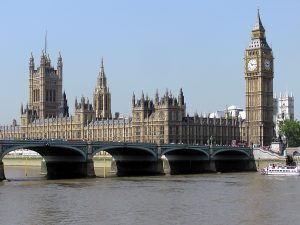
Some extension of worker and community participation is desirable. But it cannot be a substitute for managerial discretion and leadership. Corbyn’s ultra-democracy is infeasible. When it threatens parliamentary democracy it is dangerous.
The Corbynistas want to shift power away from Parliament. They want MPs to follow ‘the will of the people’, which means, in practice, the implementation in Parliament of the resolutions of their local constituency parties. Inadequate heed is taken of the diverse views and interests of the electorate, and the need for expert deliberation and debate to make policy feasible and effective.
Instead of careful, empirically-grounded debate among diverse viewpoints, aimed at developing viable policies to deal with complex economic and political problems, Corbynistas are suspicious of dissent from their official line.
Any defence of markets or private ownership is worrying for them. It challenges their ‘obvious’, ‘democratic’ and simplistic solutions, and therefore must be opposed. Such dissent is branded ‘Blairite’ or ‘red Tory’ or ‘neoliberal’.
Instead of pluralism and extended debate, Corbynism treats the party resolution as the correct line, which all are instructed to follow. There is little appreciation of the complexity of modern politico-economic systems, and the consequent fallibility of all decision making.
Parliamentary institutions have evolved to deal with real-world complexities. They provide some mechanisms to challenge and scrutinise legislation. By moving from representative to delegate democracy, Corbynism would corrode the basic institutions of parliamentary democracy.
Any leader of any political party committed to working through parliament would resign when 80 per cent of his or her parliamentary representatives passed a vote of no confidence in his or her leadership. When this happened, Corbyn did not resign: his primary focus is not on parliament but on the populist ‘mass movement’ outside.
Totalitarian Dangers of Populism – The Example of Venezuela
The record of both left and right populism in power is abysmal. There is an important example of left populism in power, and it is close to Corbyn’s heart.
He has always had a romantic soft spot for Latin American revolutionaries. He wrote in 2011: ‘What the Cubans and … Che Guevara were preaching in the 1960s has an even greater resonance today’. This suggests that armed insurrection is appropriate, even in those Latin American countries that have become democracies.

Jeremy Corbyn and Hugo Chávez
In 1998, the Marxist politician Hugo Chávez was elected as President of Venezuela. Using the high oil revenues during 1999-2007, his government expanded access to food, housing, healthcare, and education, especially for the poor and the indigenous minorities.
Chávez nationalized key industries and created participatory Communal Councils. His ‘Chavista’ populism emphasised the ‘will of the people’, against the rich elite and their perceived allies in the United States.
Chávez created new ‘democratic’ institutions at the base to bolster his power. In 1999, the new Constitutional Assembly, filled with elected supporters of Chávez, drafted a new constitution that made censorship easier and granted the executive branch of government more power. The Constitutional Assembly extended the presidential term. It abolished the two houses of Congress. It also granted Chávez the power to legislate on citizen rights, to promote military officers and to oversee economic and financial matters.
In 2002 Chávez was briefly deposed in a coup, which may have had support from foreign agencies such as the CIA. The hostility of the US government to his regime was no secret. But Chávez was restored to power by the army and popular mobilisations.
Chávez seized control of the courts and the electoral authority, and suppressed much of the opposition media. He removed political checks and balances, seeing them as obstacles to his socialist revolution.

Hugo Chávez
Accordingly, the device of populist democracy was used to push the country in the direction of dictatorship. The high pre-Crash oil revenues were used to address some basic needs and to buy the support of the people. These supporters were then persuaded to approve increases in presidential powers, to protect the ‘socialist revolution’ against its enemies.
Chávez failed to diversify the economy and reduce its reliance on oil. He antagonised private investors. The economy was not robust enough to withstand the post-2008 oil price collapse. His government had become one of the most corrupt in the world. Serious shortages of food and medicine emerged. Chávez died of cancer in 2013 and was replaced as President by Nicolás Maduro.
But Corbyn’s enthusiasm for the regime was undiminished. As late as 2015, when Venezuela was in ever-deepening crisis, he remarked:
‘we celebrate, and it is a cause for celebration, the achievements of Venezuela, in jobs, in housing, in health, in education, but above all its role in the whole world … we recognise what they have achieved.’

Food Shortages in Venezuela
These gave him powers to intervene more heavily in companies and in the currency markets. Arbitrary detentions of dissidents became more common.
In July 2016 he used his executive powers to decree that citizens could be forced to work in the country’s fields for 60-day periods, which may be extended ‘if circumstances merit.’
Starvation became rife. In August 2016 a gang of hungry Venezuelans broke into a zoo and butchered a horse for its meat.
Populism in general, and the left populisms of Chávez, Maduro and Corbyn in particular, are profound threats to any enduring and viable democracy. Using Chávez as a prime example. Kurt Weyland wrote:
‘Determined and politically compelled to boost their personal predominance, populist leaders strive to weaken constitutional checks and balances and to subordinate independent agencies to their will. They undermine institutional protections against the abuse of power and seek political hegemony. Correspondingly, populist leaders treat opponents not as adversaries in a fair and equal competition, but as profound threats. Branding rivals “enemies of the people,” they seek all means to defeat and marginalize them. Turning politics into a struggle of “us against them,” populists undermine pluralism and bend or trample institutional safeguards.’

“There’s no food”
The tragic example of Venezuela is a warning to us all. Like Corbyn, Chávez started with a fairly modest economic programme, closer to social democracy than Marxist orthodoxy. But to bolster his power, Chávez extended state control. Maduro further undermined freedom of speech and put opponents in jail.
Because of a populist mistrust of liberal, pluralist institutions, Venezuela is lurching toward despotism. Currently it retains some semblance of democracy, but press freedom is limited and critical journalists are jailed. Since 2004, ‘defamation’ of the government, including ‘disrespect for the authorities’, has been a criminal offence.
Supporters of Chávez and Maduro blame the hostility of the US for Venezuela’s distress, just as it was blamed for economic problems in Cuba after its 1959 revolution. US belligerence made things worse. But the major cause of economic stagnation in both places is the hobbling of the private sector, and the unchecked concentration of excessive political, legal and economic power in the hands of the overbearing state.
Populism must be Defeated
Although it is unlikely that either UKIP or Corbyn’s Labour will ever win power, they can do serious damage to public debate and the functioning of a parliamentary democracy. In particular, by neutering Labour as a parliamentary force, the UK is deprived of an effective opposition to the Tory government.
 Consider the example of the EU referendum in June 2016. After the result, Corbyn took it for granted that Britain should leave the EU and immediately trigger Brexit, irrespective of the outcome of Britain’s negotiations on the terms of leaving. Like his fellow-populist Farage, Corbyn accepted that ‘the people had spoken’. For him, the expression of popular will was the end of the matter.
Consider the example of the EU referendum in June 2016. After the result, Corbyn took it for granted that Britain should leave the EU and immediately trigger Brexit, irrespective of the outcome of Britain’s negotiations on the terms of leaving. Like his fellow-populist Farage, Corbyn accepted that ‘the people had spoken’. For him, the expression of popular will was the end of the matter.
After the June 2016 vote to leave the EU, Britain is probably in its worse political crisis since the Second World War. It faces years of political and economic uncertainty, with no obvious resolution. In these circumstances, popular frustration and deprivation can feed populism. Left populism has its own dangers, and we know from history that left populists can shift to the right. In turn, right populism can feed fascism.
All populisms, including Corbynism, pose a serious threat to representative democracy. As Baggini put it:
‘Our tradition of representative democracy rests on a rejection of all three pillars of populism. It accepts that a well-run society needs specialists and full-time politicians whose judgments often carry more weight than those of voters who put them into power. It accepts that the “will of the people” is diverse and contradictory, and that the job of politics is to balance competing demands, not simply to obey them. It follows that there are few, if any, easy solutions and that anyone who promises them is a charlatan. Making the case for representative democracy therefore means telling the electorate it doesn’t always know best, a truism that populism has turned into an elitist heresy.’
Populists do not understand that political checks and balances, safeguarded by countervailing politico-economic power, are necessary to help protect democracy and liberty. With confidence in their ‘obvious’ solutions to complex problems, they treat criticism with disdain and close down reasonable discussion. All must ‘unite behind the leader’ who is revered for saving the masses from the enemy elite.
For these reasons Corbynism must be treated as a dangerous ideological threat to a liberal democracy, and not as an infantile, reversible outburst of ultra-leftism.
No-one has a feasible strategy to turn Labour back to its previous form. History offers no clear example of the internal undoing of populist fanaticism. It has always been defeated from outside. Labour is now irretrievable: there is no way of reversing the populist entrenchment within.
Corbyn’s Labour is a danger for the British political system as the Tories are for its economy and for its social fabric. Corbynism is a threat to liberal, pluralist democracy.
We need to build a progressive opposition to both Toryism and Corbynism. We need to defend liberal, pluralist democracy from the populisms of left and right. Building an alternative will take a generation, but we must start now.
16 September 2016
Minor edits: 17,18, 22 September 2016
Major edit: 18 June 2017

Bibliography
Bagehot (2016) ‘Why a “True Labour” splinter party could succeed where the SDP failed’, The Economist, 12 April. http://www.economist.com/blogs/bagehot/2016/08/labour-pains.
Baggini, Julian (2016) ‘Jeremy Corbyn is a great populist. But that’s no good for our democracy’, The Guardian, 30 July. https://www.theguardian.com/commentisfree/2016/jul/25/jeremy-corbyn-populist-democracy-mps.
Borger, Julian (2016) ‘Venezuela’s worsening economic crisis’, The Guardian, 22 June. https://www.theguardian.com/world/2016/jun/22/venezuela-economic-crisis-guardian-briefing
Canning, Paul (2016) ‘Venezuela: The Left’s giant forgetting’. http://paulocanning.blogspot.co.uk/2016/09/venezuela-lefts-giant-forgetting.html
Corbyn, Jeremy (2011) ‘Foreword, to John A. Hobson, Imperialism: A Study’, facsimile reprint of 1902 edition (Nottingham: Spokesman).
Cunliffe, Rachel (2016) ‘Corbyn looks the other way as Venezuela self-destructs’, 18 January, http://capx.co/corbyn-looks-the-other-way-as-venezuela-self-destructs/.
Lawson, Neal (2016) ‘Social democracy without social democrats: how can the left recover?’ New Statesman. 12 May. http://www.newstatesman.com/politics/staggers/2016/05/social-democracy-without-social-democrats-how-can-left-recover.
Telesur (2015) ‘British MP Jeremy Corbyn speaks out for Venezuela’, 6 June. http://www.telesurtv.net/english/news/British-MP-Jeremy-Corbyn-Speaks-Out-For-Venezuela-20150605-0033.html.
Weyland, Kurt (2013) ‘The threat from the populist left’, Journal of Democracy, 24(3), pp. 18-32.
Wikipedia (2016) ‘Populism’. https://en.wikipedia.org/wiki/Populism.
Posted in Democracy, Jeremy Corbyn, Labour Party, Left politics, Liberalism, Populism, Socialism, Uncategorized, Venezuela
August 16th, 2016 by geoffhodgson1946
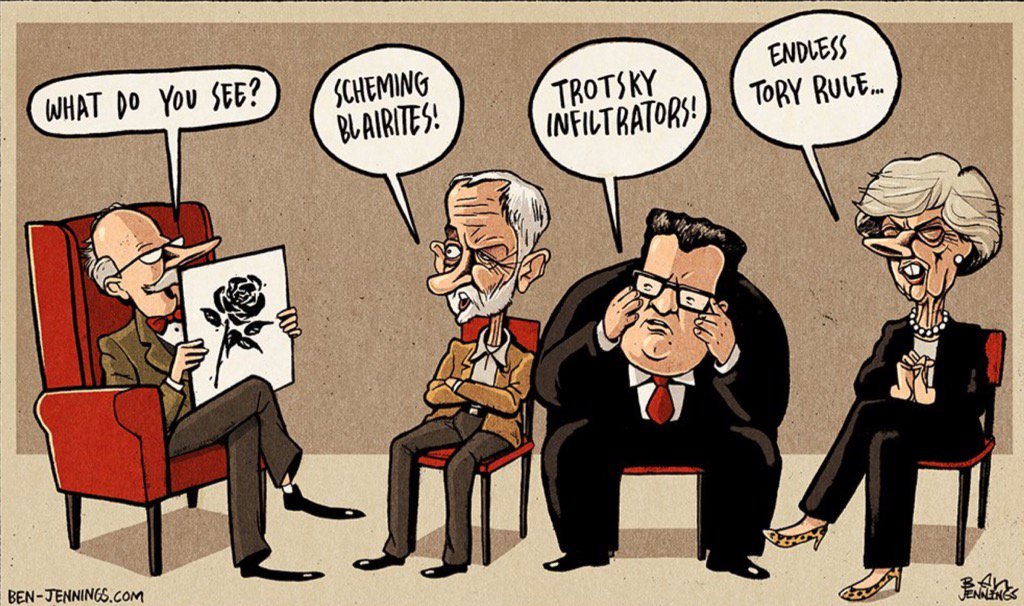
Geoffrey M. Hodgson
“This, from the always measured g. m. hodgson, shows Labour’s existential crisis in horrifying detail” – Susan Wilde
“The revolutionary road: excellent sober distillation of Marxism/Leninism/Trotskyism/socialism; rights v insurrection” – Rich Greenhill
“A very good summary of Labour and Trotskyism” – Gerry Hassan
“Another fantastic article!” – Lily Jayne Summers
John McDonnell, the Labour Shadow Chancellor, is an admirer of Trotsky. Corbyn once called upon the USSR to rehabilitate the Russian revolutionary.2
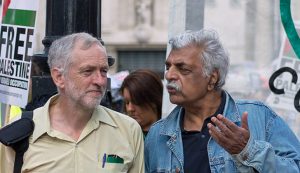 Trotskyists are socialists who believe in the common ownership of the means of production. This goal was stated in Labour’s Clause Four from 1918 to 1995, so why shouldn’t Trotskyists be allowed to join Labour?
Trotskyists are socialists who believe in the common ownership of the means of production. This goal was stated in Labour’s Clause Four from 1918 to 1995, so why shouldn’t Trotskyists be allowed to join Labour?
Trotskyists differ from the devotees of Mao Zedong or Joseph Stalin. Trotskyists do not describe the murderous regimes of Mao’s China and the USSR as socialist. They promote themselves as anti-totalitarian, and they might seem much more democratic than other Marxists.
So why shouldn’t Trotskyists be allowed to join Labour?
The Parliamentary versus the Revolutionary Road
There is a prominent negative answer to this question. It raises profound differences of strategy. As Neil Kinnock (who did the party a great service by kicking out Militant in 1985) said in a speech to the Parliamentary Labour Party in July 2016:
‘In 1918 in the shadow of the Russian revolution [Labour members decided] … that they would not pursue the revolutionary road – it was a real choice in those days. They would pursue the parliamentary road to socialism.’
According to this view, Labour members and revolutionary Marxists share the same aim – socialism – but they differ on the method of getting there. Labour follows the parliamentary road; Marxists choose the revolutionary road.

Robert Owen
There are big problems with a part of this argument. Socialism was defined by Robert Owen and Karl Marx in terms of common ownership of the means of production and ‘the abolition of private property’.
But at least in practice since 1945, Labour has been less and less devoted to this goal. Finally, the goal of ‘common ownership’ was removed from Clause Four of the Labour Party Constitution in 1995.
Labour now says that it is a ‘democratic socialist’ party but defines this not in terms of common ownership. Instead there is a goal of social solidarity, believing ‘that by the strength of our common endeavour we achieve more than we achieve alone’, and in a society ‘in which power, wealth and opportunity are in the hands of the many not the few’.
Arguably, such a goal might be achievable in a reformed capitalism. But Trotskyists, like all Marxists, are emphatically against capitalism.
What Trotskyists and the post-1995 Labour Party Constitution mean by ‘socialism’ are very different. The divergences between Labour and Trotskyists concern different ends, as well as different means.
But Corbyn’s election as Leader by over 59 per cent of the membership in 2015 shows that the traditional definition and goal of socialism in the Labour Party is far from dead and buried. Under Corbyn’s leadership, Labour could return to its pre-1995 goals.
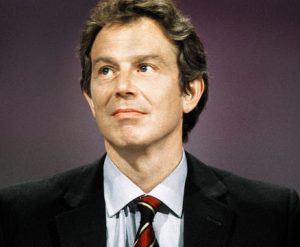
Tony Blair
Ironically, by getting rid of the traditional ‘common ownership’ version of socialism in 1995, but retaining the word ‘socialism’ in an attempt to invest it with a different meaning, Tony Blair provided legitimacy for any later attempt by classical socialists – including currently by Trotskyists and Corbynistas – to restore Labour to its original colours.
Within Labour today, because of this legacy, everyone from Trotskyists and Corbynistas at one extreme, through Owen Smith, Neil Kinnock and then on to Tony Blair at the other extreme, is obliged to call themselves a ‘socialist’. But there are massive silences and huge disagreements on its meaning.
Labour becomes less capable of discussing fundamental differences of goal, but clings onto the illusion of the fundamental goodness of something called ‘socialism’. Labour’s problem of entryism will never go away while the s-word continues to cast its spell. The word itself is an invitation for those who propose the common ownership of anything to join.
The Totalitarian Politics of Class Struggle
There are other fundamental problems with Marxism in general, and Trotskyism in particular. First, Marxism rejects the supreme values of the Enlightenment.
For example, Frederick Engels in Socialism: Utopian and Scientific, saw these Enlightenment values as ‘nothing more than the idealized kingdom of the bourgeoisie’ with its ‘bourgeois justice’, its ‘bourgeois equality before the law’ and ‘bourgeois property … proclaimed as one of the essential rights of man’.
 Marxists do not see the French Revolutionary principles of liberty, equality and fraternity as a potential achievement for all, but the rhetoric of the rising capitalist class in the class struggle against the old feudal order.
Marxists do not see the French Revolutionary principles of liberty, equality and fraternity as a potential achievement for all, but the rhetoric of the rising capitalist class in the class struggle against the old feudal order.
After playing their progressive historic role, Enlightenment ideas are seen as ‘bourgeois’ ideology, which now serves to repress the working class.
Marx saw socialism as the class destiny of the proletariat, which by overthrowing capitalism would emancipate humankind from inequality and exploitation. Socialism was not validated by an appeal to justice or rights. Instead it was grounded on ‘material’ and ‘economic’ developments within capitalism that were leading to growing internal crises and the rise of the proletariat.
Marx rejected all appeals to rights or justice. He bypassed the issues of morality and justice by focusing on the real social forces allegedly leading to socialism. But neither the driving forces of history nor the supposed destiny of a social class make this socialist future just, or morally right.
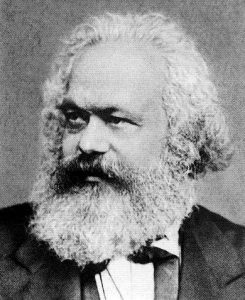
Karl Marx
By shelving the discourse on rights, in favour of the scientifically-clothed rhetoric of proletarian destiny, all versions of Marxism – including Trotskyism – are on the slippery slope toward totalitarianism.
When rights are no longer universal, and no-one has the protection of an independent legal system, the any action that is deemed ‘counter-revolutionary’ or ‘against the interests of the working class’ gives the accused no effective defence. The prosecutors monopolise the interpretation of guilt. Arbitrary punishment can follow.
The rights of critics and dissenters have to be protected, by their formal recognition and the autonomy of the judiciary. Unless this is done, any criticism can be crushed.
Trotsky was wrong: the roots of totalitarianism do not lie principally in the personalities of brutal, power-hungry individuals such as Stalin, but in Marxism itself. As Leszek Kolakowski suggested:
‘Marx’s anticipation of perfect unity of mankind and his mythology of the historically privileged proletarian consciousness … were responsible for his theory being eventually turned into an ideology of the totalitarian movement: not because he conceived of it in such terms, but because its basic values could hardly be materialized otherwise.’
Violence versus Parliament and Law
Laws get in the way of revolutionary struggle. Hence, along with their dilution of the notion of rights, Lenin proposed that all laws should be abolished.
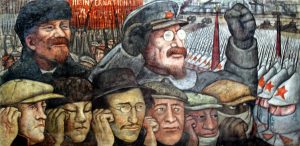 Writing in 1918, Lenin described the desired ‘dictatorship of the proletariat’ as ‘rule based directly upon force and unrestricted by any laws. The revolutionary dictatorship of the proletariat is rule won and maintained by the use of violence by the proletariat against the bourgeoisie, rule that is unrestricted by any laws.’ Trotsky supported Lenin in this and most other respects.
Writing in 1918, Lenin described the desired ‘dictatorship of the proletariat’ as ‘rule based directly upon force and unrestricted by any laws. The revolutionary dictatorship of the proletariat is rule won and maintained by the use of violence by the proletariat against the bourgeoisie, rule that is unrestricted by any laws.’ Trotsky supported Lenin in this and most other respects.
Consequently, a fundamental problem with Marxism is its failure to support the universality of human rights. Human rights apply to all, as in the majestic 1948 United Nations Declaration of Universal Human Rights.
Instead, Marxists see social advancement as a matter of ‘class struggle’ where one class must seize power and remove rights from another class. Lenin and Trotsky went one step further: they argued that this struggle for proletarian power must override the rule of law.
The Second Congress of the Communist International took place in Russia in 1920. Under the leadership of Lenin, one of its resolutions mentioned ‘bourgeois parliaments’ and declared:
‘The task of the proletariat consists in breaking up the bourgeois state machine, destroying it, and with it the parliamentary institutions, be they republican or constitutional monarchy.’
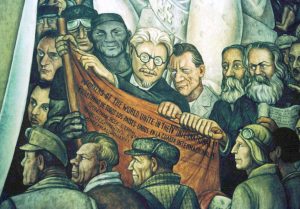 Throughout his life, Trotsky defended the decisions of the first four congresses of the Communist International, which took place when Lenin was alive and before Stalin seized power.
Throughout his life, Trotsky defended the decisions of the first four congresses of the Communist International, which took place when Lenin was alive and before Stalin seized power.
Trotsky added his own idea of ‘permanent revolution’, involving civil war, even in a parliamentary democracy:
‘Socialist construction is conceivable only on the foundation of the class struggle, on a national and international scale. This struggle … must inevitably lead to explosions, that is, internally to civil wars and externally to revolutionary wars. Therein lies the permanent character of the socialist revolution as such, regardless of whether it is a backward country … or an old capitalist country which already has behind it a long epoch of democracy and parliamentarism.’
Conclusion: Hands Tied Behind their Backs
Those in Labour wanting to fight the battle against entryism have two hands tied behind their backs.
 First, by hanging on to the word ‘socialism’, after abandoning its original meaning, it is difficult to exclude those who are more genuinely socialist in the classical sense of common ownership. Labour’s obligatory (but now shallow) rhetoric of ‘socialism’ is a green light for socialist entryists of all kinds.
First, by hanging on to the word ‘socialism’, after abandoning its original meaning, it is difficult to exclude those who are more genuinely socialist in the classical sense of common ownership. Labour’s obligatory (but now shallow) rhetoric of ‘socialism’ is a green light for socialist entryists of all kinds.
Second, Labour has long-ago ditched the politics of class struggle, but it retains a notion of class partisanship in its very name. It was formed historically to represent the interests of the working class. It was built upon the trade union movement. Labour itself is a class party.
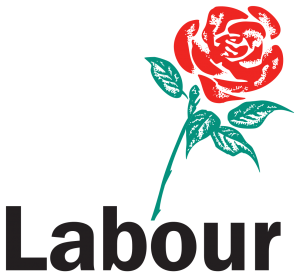 Of course, Labour in practice has put aside the notion that it is speaking for one section of society only. But its name remains a problem, both for broadening its appeal and for barring the more energetic and extreme exponents of working class representation and power.
Of course, Labour in practice has put aside the notion that it is speaking for one section of society only. But its name remains a problem, both for broadening its appeal and for barring the more energetic and extreme exponents of working class representation and power.
Of course, to achieve its goals, Labour is pledged to working through parliament, rather than through revolution. This is a very important difference. Many Marxists are still devoted to insurrection. Labour clearly is not. With this one big foot it can kick back. But its two hands are tied.
Labour still has much outdated baggage to deal with. Even if it staves off Trotskyist entryism – which now seems unlikely, at least while Corbyn is Labour Leader – it still will have a number of big problems. It will need to find and package a new identity for itself, which is suitable for the twenty-first century.
Retaining an unconvincing redefinition of ‘socialism’ and calling itself ‘Labour’ will not do.
Labour needs to come to terms with the fact that both classical socialism and class politics are untenable. It has to put democratic and progressive Enlightenment values at its centre, and reconfigure itself for the challenges of the twenty-first century.
16 August 2016
Minor edits: 17-18 August 2016
Endnotes
- Note that I refrain in this article from estimating the scale or impact of Trotskyist entryism in the Labour Party. They are not central to my argument here. For evidence of both (and of Corbyn’s links with the IRA) see here. At least currently, entryists into Labour are probably few in number, but it is a well-established fact that a few determined people can influence many thousands.
- In 2010, McDonnell attended an event commemorating the 70th anniversary of Trotsky’s assassination and has praised the ‘importance’ of his ideas (Riley-Smith 2016a). In 1988 Corbyn demanded from Parliament that the USSR should ‘give complete rehabilitation to Leon Trotsky’ (Riley-Smith, 2016b). Nothing wrong with that, but its shows the way he leans and who he chooses as friends.
- Personal note: I was a critical and wobbly Trotskyist from 1968 to 1973. I re-joined the Labour Party in 1974 and left it in 2001. The photograph below shows me (not then a Trot) visiting Trotsky’s house in Mexico in 1981, where he was murdered in 1940. It is a moving and impressive place.

References
Crick, Michael (2016) Militant (London: Biteback Publishing), esp. pp. xvii–xviii.
Kolakowski, Leszek (1977) ‘Marxist Roots of Stalinism’, in Robert C. Tucker (ed.) (1977) Stalinism: Essays in Historical Interpretation (New York: Norton), pp. 283-98.
Lenin, Vladimir Ilyich (1967) Selected Works in Three Volumes (London: Lawrence and Wishart), esp. vol. 3, p. 49.
Marx, Karl and Engels, Frederick (1962) Selected Works in Two Volumes (London: Lawrence and Wishart), esp. vol. 2, p. 117.
New Park Publications (1977) The Second Congress of the Communist International, 2 vols (London: New Park), esp. vol. 2, p. 52.
Riley-Smith, Ben (2016a) ‘Labour Entryism Row: John McDonnell Attended Celebration of Leon Trotsky and Praised ‘Importance’ of his Ideas’, The Telegraph, 14 August. http://www.telegraph.co.uk/news/2016/08/14/labour-entryism-row-john-mcdonnell-attended-celebration-of-leon/.
Riley-Smith, Ben (2016b) ‘Jeremy Corbyn Called for a “Complete Rehabilitation” of Leon Trotsky in Parliament’, The Telegraph, 16 August. http://www.telegraph.co.uk/news/2016/08/15/jeremy-corbyn-called-for-complete-rehabilitation-of-leon-trotsky/
Sparrow, Andrew and Jones, Harrison (2016) ‘Secret Recording of Kinnock’s anti-Corbyn Speech to MPs – In Full’, The Guardian, 6 July. http://www.theguardian.com/politics/2016/jul/08/secret-recording-neil-kinnock-jeremy-corbyn-step-down-speech-to-mps-in-full.
Trotsky, Leon D. (1962) The Permanent Revolution and Results and Prospects (London: New Park), esp. ch. 10.
Watson, Tom (2016) ‘Tom Watson Sends Corbyn “Proof of Trotskyist Labour Infiltration”’, The Guardian, 10 August. http://www.theguardian.com/politics/2016/aug/10/tom-watson-sends-corbyn-proof-of-trotskyist-labour-infiltration
Posted in Common ownership, Democracy, Jeremy Corbyn, Labour Party, Left politics, Liberalism, Nationalization, Robert Owen, Socialism, Tony Benn, Tony Blair, Uncategorized
August 10th, 2016 by geoffhodgson1946

Geoffrey M. Hodgson
‘This is a thundering good read’ – Peter Smith
‘The best article I’ve read for a while’ – Karen Bradley
‘Brilliant on why socialism isn’t “obvious”’ – Robbie Hudson
‘Very informative & sobering. Highly recommended’ – Jan Davies
One thing in British politics is very obvious: Jeremy Corbyn and his followers are very keen on something they call socialism. But this word has migrated in meaning since it first appeared in English in 1827. So it is reasonable to ask what they mean by it.
I’ve tried. I got lots of vague answers.
I fully appreciate that the Mirror is an unsuitable forum for a detailed account of the workings of the future socialist utopia, but unfortunately I have little else to go on. Apart from some gestures in favour of nationalization, and some sentimentality for the pre-Blair version of Labour’s Clause Four, I can find no fuller account of what Corbyn’s ‘socialism’ means.
Yet we are told twice (in one short quote) that it is ‘obvious’.
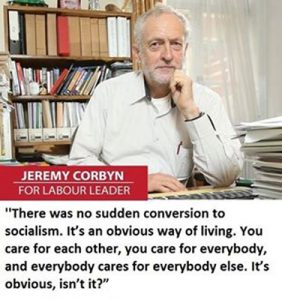 Here is my own confession: fifty years ago I believed that socialism was ‘obvious’. Eventually I was persuaded otherwise. Initially, it was not my growing awareness of the horrendous consequences of the socialist experiments in Russia, China and elsewhere that jolted me.
Here is my own confession: fifty years ago I believed that socialism was ‘obvious’. Eventually I was persuaded otherwise. Initially, it was not my growing awareness of the horrendous consequences of the socialist experiments in Russia, China and elsewhere that jolted me.
My comrades and I saw these deformations as unfortunate results of Stalinist bureaucracy plus Western hostility. We believed that a different, ‘democratic socialism’, was possible.
What persuaded me that socialism is not ‘obvious’ was a consideration of how such a system could work, in detail and in practice. How would production and distribution be organised? How would dispersed information concerning production and distribution be gathered and processed? How would resources be allocated? Who would decide? How would trillions of dispersed decisions be somehow processed by democratic committees? How would less-devoted workers be incentivized or persuaded to work harder or with greater attention to detail? What incentives would exist to encourage innovation and change, especially when everything had to be referred to some democratic council? And so on.
Once you begin to ask these difficult questions, socialism becomes much less ‘obvious’.
Numbers and incentives
Some version of socialism might work on a small scale. Cooperation can work in small groups, based on close, inter-personal interactions. Humans have co-operated in this way, in families and tribal units, for many thousands of years.
 Nobel Laureate Elinor Ostrom studied the management of common-pool resources – such as medieval common land, fisheries or agricultural irrigation schemes – and showed how they can be effectively managed by relatively small local communities.
Nobel Laureate Elinor Ostrom studied the management of common-pool resources – such as medieval common land, fisheries or agricultural irrigation schemes – and showed how they can be effectively managed by relatively small local communities.
Their small size allows participants to monitor each other, to ensure that necessary tasks are carried out and that the interests of the community are served.
Enforcement mechanisms range from praise to punishment. Within these relatively small and cohesive groups, trust and targeted sanctions are mechanisms for encouraging cooperation, reciprocity and compliance with social rules.
But these mechanisms depend on a degree of familiarity with one another. Big problems emerge when we move from tribal to large-scale societies. These began to develop about twelve thousand years ago. Our natural and cultural dispositions to cooperate and to help one another had to be supplemented by other mechanisms.
In larger societies, face-to-face, trust-based mechanisms to sustain cooperation are relatively less effective. When we move from communities of a hundred or so, where it is possible for everyone to know everyone else, to communities of thousands or more, then interpersonal trust and reputation are much less successful with large-scale interactions, and they have to be supplement by other incentives and constraints.

The increase of scale can create incentive problems that can be overcome in smaller communities. Many socialist experiments involved collectivisation. But when thousands of people are brought together, and rewards are shared, then there is less incentive to make the extra effort, because the rewards from that additional work would be hugely diluted.
This problem was illustrated dramatically in China. After the Communist Revolution of 1949, agriculture was organized into large collective farms. Farmers had little incentive to improve productivity, other than by threats and bureaucratic bullying. Risky innovation was unwise. Productivity remained low and often there were shortages of food.
Mao Zedong died in 1976, opening up the possibility of reform. In 1978 some peasant farmers decided to withdraw from collective farms and take responsibility for production at the household level, where the household (instead of the collective) received the revenue from its sold output. Individual households had much greater incentives to work harder and to innovate.
After decades of slow growth under Mao, China’s explosive economic growth began with those changes in rural areas. As a result, unprecedented millions were lifted out of poverty. China’s spectacular economic growth began when agriculture began to pass into the private control of the peasants after 1978.
|
This book by G. M. Hodgson elaborates on some of the political issues raised in this blog:
Wrong Turnings: How the Left Got Lost
Published by University of Chicago Press in January 2018
|
While interpersonal interactions can engender cooperation on a small scale, and they continue to do so in families and small communities, in large-scale societies other mechanisms and incentives are necessary. Economic history teaches us that modern dynamic economies depend on markets, competition and a large private sector, as well as an effective state.
 Corbyn is right: it is very important that we care for one another. But in terms of practical input, we cannot care equally for everyone. We can care more readily for those close to us, who we know well: our family, our friends and our workmates. But extending our caring to society as a whole becomes more of a political and less of a personal project. We need caring governments, but the practical extension of caring from the personal to the political is neither obvious nor easy.
Corbyn is right: it is very important that we care for one another. But in terms of practical input, we cannot care equally for everyone. We can care more readily for those close to us, who we know well: our family, our friends and our workmates. But extending our caring to society as a whole becomes more of a political and less of a personal project. We need caring governments, but the practical extension of caring from the personal to the political is neither obvious nor easy.
The need for countervailing power
A simplistic response would be to suggest that we elect a government that is staffed by well-meaning individuals. But to different degrees, almost everyone is corruptible. Even the uncorrupt have their own biased agendas and priorities.
 There is a need for rules, monitoring and countervailing power. If all economic power is concentrated in the bureaucracy of planners, then will be no effective alternative power that can countervail.
There is a need for rules, monitoring and countervailing power. If all economic power is concentrated in the bureaucracy of planners, then will be no effective alternative power that can countervail.
Even if politicians are competent and well meaning – lots of them are – they still face the problems of dispersed knowledge and uncertainty in modern, large-scale, and highly complex economies.
Consequently, relatively little can be planned from the top. Solutions to real-world, nitty-gritty problems are rarely ‘obvious’. There is a need for both humility and experimentation. We need to try and see what works and learn from mistakes, rather that rushing headlong towards what seems obvious.
The survival of democracy depends on a dispersion of real economic and political power. A healthy, pluralist polity depends on a pluralist economy, with multiple centres of autonomous decision-making. This means a system of private enterprise, as well as a political system with checks, balances and power that can be held to account. The state can and must also play a vital role in the economy, but not to the extent that it smothers private enterprise and initiative.
There is a large and fascinating analytical literature on the problems involved in classical socialism, and I cite a few works on this below. There is not the space to go into it further here. These works are not all written by neoliberals. But intelligent neoliberals – despite their limitations – are often worth reading. Although there are disagreements on approach and detail, the general conclusion is that large-scale socialism cannot work effectively and democratically. This analytical conclusion is corroborated by the historical experience of stagnation in innovation in Soviet-style regimes.1
The ‘obvious’ roots of fanaticism and intolerance
The ‘obviousness’ of socialism empowers its supporters with enduring energy and even fanaticism. If socialism is ‘obvious’, how do we explain the failure of other intelligent people to get on board? If they are not stupid, then they must be acting out of personal malice or greed. They must have sold out their principles in some way. Or they are just plain nasty. When socialism is seen as ‘obvious’, its opponents are regarded as stupid or evil.
The perceived ‘obviousness’ of socialism fuels both fanaticism and intolerance. Because the solution to the problem is ‘obvious’, there can be no doubt. There is no need to experiment, to seek wise counsel, or to listen to critics. Those that deny the obvious are deluded, corrupted, or in the pay of those that gain from the existing system.
 The great American politician Robert F. Kennedy once said:
The great American politician Robert F. Kennedy once said:
‘What is objectionable, what is dangerous about extremists is not that they are extreme, but that they are intolerant. The evil is not what they say about their cause, but what they say about their opponents.’
We have seen this elsewhere, in the brutal fanaticism of religious zealots, as well as in the murderous tragedies of twentieth-century socialism under Stalin and Mao. They all shared in common the absence of doubt, the certainty of redemption or victory, and the confidence in their own righteousness.
It is deeply saddening that the once-great British Labour Party has been taken over by people who think that their aims and long-term solutions are ‘obvious’. Once the zealots take over, there is no way back. The party is then trapped in a vicious circle.
A diminished vote in an election is a success because it is seen as a big vote for a purer socialism. When Labour lost the 1983 election on a socialist manifesto, with the lowest share of the vote since 1918, Tony Benn greeted the result as a triumph for socialist ideas.
 Even small successes – such as winning elections to parish councils – feed frenzies of celebration. All acknowledged failures are blamed on others, such as the ‘mainstream media’ or the ‘traitors’ within.
Even small successes – such as winning elections to parish councils – feed frenzies of celebration. All acknowledged failures are blamed on others, such as the ‘mainstream media’ or the ‘traitors’ within.
With an ideology where no possible event can falsify the ‘obvious’, the doubters are purged. The wise give up. The fanatics win.2
Touting socialism as an ‘obvious’ solution empowers a fanaticism that can crush all traces of liberal tolerance, which is essential for democracy within any political party, as well as within the political system as a whole. Corbyn’s victory in the 2016 leadership election marks the point of no return for Labour. It is beyond the beginning of the end. Labour is now dying. Thoughtful radicals must go elsewhere.
10 August 2016
Minor edits – 11-13 August 2016
A version of this post was published in the i newspaper on 11 August.
More comments on this post:
‘A gloomy but sadly very acute and perceptive analysis’ – Helen Salmon
‘Definitely one of his best, and the best thing I’ve read all week’ – Tom Atkinson
‘Excellent article on the anti-democratic nature of seeing one’s views as “obvious”’ – Francis Hoar
‘Brilliant piece on why “obvious” socialism leads to intolerance (and doesn’t work either)’ – Colin Talbot
‘Thank you so much for your still small voice of reason: it is worth its weight in gold amid this chaos’ – Elizabeth Jones
End Notes
- A recent contribution of mine on the socialist calculation debate can be found here.
- After publication, Colin Williams kindly pointed out that the Russell quote that heads this post – although widely attributed to him and close to other similar quotes by Russell – cannot be found in this exact form in Russell’s works.
Bibliography
Hayek, Friedrich A. (1944) The Road to Serfdom (London: George Routledge).
Hodgson, Geoffrey M. (2015) Conceptualizing Capitalism: Institutions, Evolution, Future (Chicago: University of Chicago Press).
Lavoie, Donald (1985) Rivalry and Central Planning: The Socialist Calculation Debate Reconsidered (Cambridge: Cambridge University Press).
Mill, John Stuart (1859) On Liberty (London: John Parker & Son).
Nove, Alexander (1991) The Economics of Feasible Socialism Revisited (London: George Allen and Unwin).
Ostrom, Elinor (1990) Governing the Commons: The Evolution of Institutions for Collective Action (Cambridge: Cambridge University Press).
Steele, David Ramsay (1992) From Marx to Mises: Post-Capitalist Society and the Challenge of Economic Calculation (La Salle, Illinois: Open Court).
Zhou, Kate Xiao (1996) How the Farmers Changed China (Boulder, CO: Westview Press).
Posted in Common ownership, Democracy, Jeremy Corbyn, Labour Party, Left politics, Liberalism, Markets, Politics, Private enterprise, Socialism, Tony Benn
July 14th, 2016 by geoffhodgson1946

Originally posted 14 July 2016
“A lucid and persuasive piece” – Richard Surr
“A very thoughtful and informative article” – John Boughton
“A frank and thought-provoking assessment” – John Hill
“An excellent and thought-provoking article” – Michael Kelly
“A great read” – Graham Sutton
Geoffrey M. Hodgson
12 July 2016 will go down in UK history for two major political events. First, it was the last full day that David Cameron was Prime Minister. Second, the National Executive Committee of the Labour Party decided to put Jeremy Corbyn on the membership ballot for the party’s re-election of Labour’s leader, despite an overwhelming vote of no confidence against him by Labour MPs.
On this day, the Labour Party destroyed its chances of victory in the next general election. A party so deeply divided cannot win. For Labour, this is the most optimistic assessment: 12 July 2016 might come to be seen as the day that Labour died.
|
My latest book elaborates on some of the political issues raised in this blog:
Wrong Turnings: How the Left Got Lost
Published by the University of Chicago Press in January 2018
|
Progressive Left politics in Britain has to be rebuilt. It is as if the clock has been turned back 100 years. We must begin again.
Labour’s Grim Prospects
Labour now faces another election among its members for its Leader. Even with a strong and commanding alternative candidate, Corbyn is likely to win this contest. This would leave Labour as a party in Parliament where 80 per cent of its MPs have no confidence in its leader.
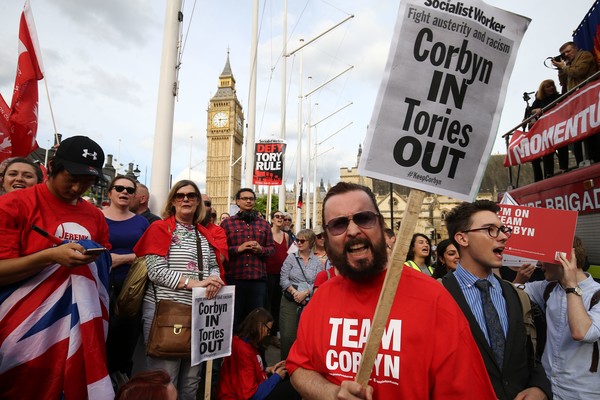 Consequently, all 172 of the ‘rebels’ would face possible deselection by their local constituency parties. Few would survive the show trials by Corbynistas for their alleged crimes. They would be replaced by hard-left stalwarts.
Consequently, all 172 of the ‘rebels’ would face possible deselection by their local constituency parties. Few would survive the show trials by Corbynistas for their alleged crimes. They would be replaced by hard-left stalwarts.
In a more optimistic scenario, suppose that Corbyn is defeated for Leader in the membership vote. At least then, the Parliamentary Labour Party and much of the Labour Party machine would be ostensibly in the same hands. But the party would be in civil war. It would become a cockpit of personal abuse and factional machination, unattractive to ordinary, thoughtful, soft-spoken, Labour supporters. Many of the so-called rebels would be deselected by the local parties that were in Corbynista hands.
Electorates are not fond of parties that are unable to quash their internal feuds. Voter want results – not rifts. The Tories are masters of the swift coup to end dissent. That is because they have a thirst for governmental power. Sadly, much of the Labour membership does not. They prefer to be ideologically pure. That is why Labour is dying. It looks likely to be pulverised in a general election. The chances of a majority Labour government have disappeared, at least for 2020 and maybe forever.
Will the Majority of Labour MPs Breakaway?
Assume that a large segment of Labour MPs breaks away and forms a new party. If their numbers were sufficient, then they could claim the official mantle of Her Majesty’s Opposition. They might outnumber the remaining parties, including the SNP and Corbyn’s Rump Labour. They would have to find a new name, be it ‘Social Democratic Labour’ or whatever.
Finding a name would be the least of their problems.
First the new party would have to be built up from the grassroots, in every winnable constituency. Then there would be the problem of party funding. Gaining credibility in Scotland would also be important.
The Global Crisis of Social Democracy
Added to all this is the global ideological crisis within social democracy itself. Social democracy was originally synonymous with socialism, where the latter meant an economy dominated by public enterprise and planning. Many of the early ‘social democratic’ parties were led by Marxists, including the Social Democratic Workers’ Party of Germany, founded in 1869. Although some social democrats favoured peaceful reform rather than violent revolution, they mostly agreed on the goal of large-scale common ownership.
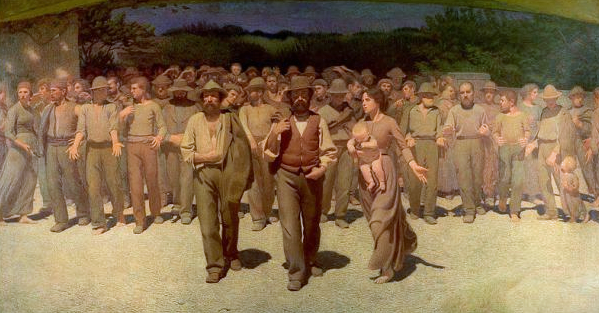
Social democracy began to change its meaning more substantially after 1945, especially when the German Social Democratic Party embraced private enterprise and a mixed economy in 1959. Today social democracy is often distinguished from socialism in terms of a stronger emphasis on a mixed economy and private enterprise, while retaining the goal of greater equality and social justice.
As Neal Lawson has pointed out, modern European social democracy was built during, and affected by, the Cold War of 1948-1991. It was also founded on a mass industrial working class. Until the 1970s there was a widespread concern the USSR might overtake the West in terms of productivity and economic prowess. Post-1945 social democracy was forged as a compromise between Soviet planning and market economy, within a democratic political system, based on the support of industrial workers and progressive intellectuals.
But the sixteen years from 1975 to 1991 saw this consensus collapse. The post-war political settlement, accepted by parties on the Left and Right, disappeared. In addition, de-industrialisation in the West and the shift of much manufacturing to East Asia, pulverised the traditional working class base. The collapse of the Berlin Wall in 1989 ended the Soviet Bloc and its experiment with socialism.

Fall of the Berlin Wall 1989
Consequentially, modern social democracy is now in crisis the world over. It is failing in government in France and it is in retreat almost everywhere else, including in its great heartlands in Northern Europe, and no less in Germany and Scandinavia.
Social democrats have been slow to adjust. As Lawson has argued, they have retained ‘their statism and tribalism, their urge to command and control’. They are ‘at odds with a zeitgeist that demands pluralism, complexity’. They failed to develop an adequate alternative vision of ‘a good society that is about much greater equality but is at odds with consumption without end.’
A problem shared by Marxist, ‘Labour’ and social-democratic parties is that they all stem from a post-Enlightenment, doctrinal offshoot (around Louis Blanqui and others in the 1830s) that focused on the interests and aspirations of the working class, rather than on those of humanity as a whole.
Marxism went furthest in this direction, with its doctrine of class struggle and the ‘dictatorship of the proletariat’. But the very name ‘Labour’ speaks to one class rather than to all humanity. One of the great lessons of the Enlightenment is that human rights are universal. Especially in our fractured world, political parties should have a universal appeal.
In particular, the very aim of greater economic equality should be seen not as an outcome of envy, struggle or revenge, but as a moral mission to make society more amenable and cohesive for all.
Class-based, social-democratic, mind-sets have dominated both the Left and Right of the Labour Party for the last seventy years. If the majority of Labour MPs try to build something out of the ruins, then they will face the profound problem of reconstructing their own philosophy and identity for the twenty-first century, alongside a myriad of other practical difficulties.
Radical Liberalism
I do not pretend that I have adequate answers, but I am sure that a new radical movement that faces the problems of the twenty-first century must build on the achievement of the political and scientific Enlightenment in the seventeenth and eighteenth centuries. Hence it must relate in some way to the broad liberal tradition that stems from this Enlightenment.
 This tradition emphasises democracy, liberty, equality and cooperation. Socialism derives from the Enlightenment, but has been neither consistent nor adequate in the pursuit of these goals.
This tradition emphasises democracy, liberty, equality and cooperation. Socialism derives from the Enlightenment, but has been neither consistent nor adequate in the pursuit of these goals.
In particular, the liberal tradition also recognises that private property is essential to a dynamic economy, notwithstanding the importance of state intervention in health, education, market regulation, redistribution and elsewhere. As the twentieth century shows us, some private property is a necessary (but insufficient) guarantee of liberty. Its abolition has without exception led to totalitarianism.
It is for the reason that one of the greatest achievements of liberal and Enlightenment thought, the United Nations Universal Declaration of Human Rights, includes these words: ‘Everyone has the right to own property alone as well as in association with others. No one shall be arbitrarily deprived of his property.’ Property, in short, is a basic human right.
At the same time, property-owning market economies have important limitations. These must be addressed without destroying private enterprise, competition and the well-springs of innovation and wealth. Greed and individualism must be countervailed by a recognition that, just as we have all benefitted from the work of others, we have a duty to society in return. Extreme inequalities of income and wealth are deleterious to social solidarity and cohesion, and these too must be tackled. This puts radical policies, such as a guaranteed basic income and some viable form of redistributive taxation, on the agenda.

Thomas Paine
Everything I mention in the previous paragraph was considered at length by the great Anglo-American radical Thomas Paine (1737-1809). Contrary to widespread belief, Paine was not a socialist. He was a radical liberal.
Take another relevant example. John Stuart Mill (1806-1873) was concerned about the problems of inequality, in wealth, power, voting rights and income. He advocated not simply a market economy but forms of cooperation, particularly worker cooperatives.
John A. Hobson (1858-1940), was a liberal and one of the great neglected economists of the last 150 years. He developed a theory of unemployment and opposed the imperialism of the great powers.
From 1908 to 1914 Herbert H. Asquith (1852-1928), as Liberal Prime Minister, led his party to a series of major reforms, including social insurance and the reduction of the power of the House of Lords. Asquith laid the foundations of the Britain’s welfare state. His Liberal successor, David Lloyd George (1863-1945), gave the vote to women in 1919 (but not on the same terms as men).
The Liberal Democrats
So why not join the Liberal Democrats?
Imagine we are back in 2005, with Charles Kennedy as Leader, but Labour in today’s mess. For many readers the Liberal Democrats would be an attractive option.
Kennedy became leader in 1999. His party won 52 seats in the 2001 election – their highest tally since 1923. He shifted his party to the Left and– unlike Labour and the Tories – the Liberal Democrats came out firmly against the 2003 invasion of Iraq. In the 2005 general election, 62 Liberal Democrats were elected. Kennedy stood down in 2006.
Nick Clegg became leader in 2007. After the economic crash of 2008, Clegg told his party at its 2009 annual conference that ‘savage cuts’ were needed to deal with the mounting budget deficit. When the 2010 election granted no single party an overall majority, Clegg argued that Labour was incapable of making the cuts in public expenditure that he deemed necessary. This was a key argument in persuading his party to join a coalition with the Tories. Kennedy voted against this coalition.
To some degree, the coalition did act as a check on the ideological, axe-wielding, Tory Right. They blocked, and postponed for five years, the dreadful mistake of the referendum on Europe. But the Liberal Democrats under Clegg made the serious mistake of willingly participating in a misconceived and highly damaging programme of cuts in vital public services and investment.
The Liberal Democrats also wrongly blamed Labour for overspending prior to the crash. In fact, Labour had the finances under control before 2008 and the big spending was needed after the crash, to save the financial system from collapse.
Clegg and other members of the Liberal Democrats had forgotten key lessons from their own history. Asquith learned the dangers of doing deals with the Tories. Lloyd George was cast aside by them in 1922 just as Clegg’s party was deliberately crushed by the Tory machine in the 2015 election.
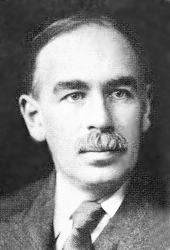
John Maynard Keynes
Just as grave was the abandonment of Keynesianism by the Liberal Democrats. John Maynard Keynes (1883-1946) was a life-long Liberal and one of the greatest economists of all time. Keynes argued that the first priority of government was not the reduction of its deficit but the maximisation of employment. Through growth and greater employment a government could accrue greater income to resolve its budgetary problems. Attempts to deal with deficits by reducing government expenditure and austerity would be self-defeating: the economy would contract (or grow more slowly) and the deficit would increase.
The failure of a strategy of austerity has become abundantly clear in the six years that George Osborne was Conservative Chancellor of the Exchequer since 2010. The Liberal Democrats need to shout more loudly that they have learned that lesson.
Labour and the Liberal Democrats – Their Aims
Ever since Labour removed its commitment to common ownership from its constitution in 1995, its institutional aims have been unclear. The current Labour Party Constitution outlines commendable principles such as by ‘common endeavour we achieve more than we achieve alone’. It laudably aims for a society where ‘power, wealth and opportunity are in the hands of the many not the few’ and ‘where we live together freely, in a spirit of solidarity, tolerance and respect’.
But these words are too vague to provide a clear goal. They might be deemed consistent with a range of idealistic plans, from statist socialism to egalitarian ‘people’s capitalism’.
Labour’s current Clause Four Part One is silent on the question of property, whether it is to be private or owned in common. Reference to ‘a thriving private sector’ is tucked away in Part Two, alongside a mention of public ownership or accountability where ‘essential to the common good’.
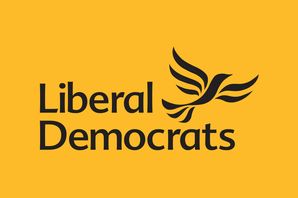 The Preamble to the Constitution of the Liberal Democrats is much clearer. It mentions ‘a strong and sustainable economy which encourages the necessary wealth creating processes, develops and uses the skills of the people and works to the benefit of all, with a just distribution of the rewards of success.’
The Preamble to the Constitution of the Liberal Democrats is much clearer. It mentions ‘a strong and sustainable economy which encourages the necessary wealth creating processes, develops and uses the skills of the people and works to the benefit of all, with a just distribution of the rewards of success.’
It continues: ‘We want to see democracy, participation and the co-operative principle in industry and commerce within a competitive environment in which the state allows the market to operate freely where possible but intervenes where necessary.’
It declares: ‘We will work for a sense of partnership and community in all areas of life. We recognise that the independence of individuals is safeguarded by their personal ownership of property, but that the market alone does not distribute wealth or income fairly. We support the widest possible distribution of wealth’.
This commitment to greater equality could be strengthened. There are other omissions, which have increased in importance in today’s multi-cultural Britain. They include measures for the development of social integration and cohesion, particularly by winding down state-funded faith schools.
No party is perfect, and we are obliged to compromise to get anywhere.
 In the current crisis, the Liberal Democrats have another strong card to play. Since 1959 they have been firmly in favour of (what is now called) the European Union. Labour was for withdrawal in 1983. Subsequently it changed its policy back to staying in. But Corbyn was in favour of leaving the EU until he became leader in 2015. His ambivalence during the referendum campaign was obvious.
In the current crisis, the Liberal Democrats have another strong card to play. Since 1959 they have been firmly in favour of (what is now called) the European Union. Labour was for withdrawal in 1983. Subsequently it changed its policy back to staying in. But Corbyn was in favour of leaving the EU until he became leader in 2015. His ambivalence during the referendum campaign was obvious.
The Liberal Democrats accept the result of the 2016 referendum but are pledged wholeheartedly to restore Britain’s strong ties with Europe, to the point of possible re-entry into the EU in the future.
So why not join the Liberal Democrats?
I just did.
I accept that others will try and retrieve something from the fragments of today’s Labour Party. Perhaps they can help build a base for progressive policies in the devastated former industrial areas, particularly in Wales and the North of England. I wish them success. We all need to work together to help make Britain and the world a better place.
14 July 2016
Bastille Day – liberté, égalité, fraternité.
Minor edits: 15-19 July 2016 and 17 August 2016.
Autobiographical Note
Born in 1946. Raised in rented council housing. Educated at state schools and at the University of Manchester. Member of the Labour Party, 1966-1968 and 1974-2001. Labour Parliamentary Candidate for Manchester Withington in 1979. Briefly advisor for Neil Kinnock and Roy Hattersley in the 1980s.
I left Labour over faith schools, inadequate House of Lords reform and neglect of economic inequality. Would have left over Iraq. Politically unaffiliated 2002-2016.
Bibliography
Claeys, Gregory (1989) Thomas Paine: Social and Political Thought (London and New York: Routledge).
Fishman, William J. (1970) The Insurrectionists (London: Methuen).
Hobson, John A. (1902) Imperialism: A Study (London: James Nisbet).
Mill, John Stuart (1848) Principles of Political Economy with Some of Their Applications to Social Philosophy (London: Parker).
Mummery, Albert F. and Hobson, John A. (1889) The Physiology of Industry (London: John Murray).
Waldron, Jeremy (1988) The Right to Private Property (Oxford and New York: Oxford University Press).
Posted in Common ownership, Democracy, Labour Party, Left politics, Liberalism, Nationalization, Politics, Socialism
July 10th, 2016 by geoffhodgson1946

“A thoughtful analysis of Labour’s current impasse – back to 1918 in more senses than one”
Niamh Hardiman, Professor of Political Science and Public Policy, University College Dublin
Geoffrey M. Hodgson
Tony Blair and Jeremy Corbyn have been pulling Labour in different directions for decades. But under the surface there are some common roots in their thinking. Also Blair created some of the circumstances in which Corbyn was decisively elected as Labour Party Leader in 2015, with 59.5 per cent of the vote.
Both Blair and Corbyn have enjoyed huge support among Labour members. How could this radical transformation of political opinion take place within a large political party, in the space of less than 20 years?
To answer this question we must first briefly examine how Labour evolved from 1945 to 1979, as a mass party based on strong trade unions. Then came the earthquake of Margaret Thatcher’s election victory in 1979. Labour was defeated in three subsequent elections, before Tony Blair led Labour into power for thirteen years. Blair had help to make Labour electable by combining a reforming momentum with a pro-business image, but he did not provide an adequate political philosophy to replace traditional socialism.
This vacuum, combined with the disastrous invasion of Iraq in 2003, and Labour’s part in the financial crash of 2008, created the conditions for the election of Jeremy Corbyn as leader in 2015. Corbyn turned Labour’s ideological clock back by over half a century and lost its prospect of electability.
Post-War Labour: The Broad Church
After the first majority Labour government was elected in 1945, Labour party individual membership was rising rapidly towards one million and trade union membership began a long upward trend, rising from about 8 million in 1945 to 13 million in 1979. In general elections from 1945 to 1979 inclusive, Labour always polled between 36 per cent and 49 per cent of the vote. Labour was a mass party, built on the pillars of organised individual membership, powerful trade union support, a strong presence in parliament, and the loyalty of over a third of the electorate.

Clement Attlee
Labour’s commitment to widespread common ownership was enshrined in Clause Four of its constitution, which had been adopted in 1918. Before he became Prime Minister in 1945, Clement Attlee had expressed his support for this full-blooded socialist vision of a planned economy with widespread public ownership. But the practicalities of government, and the outbreak of the Cold War in 1948, pushed Labour leaders and intellectuals towards social democracy and a mixed economy. The most important statement of this shift was Anthony Crosland’s The Future of Socialism in 1956.
But, despite the efforts of Hugh Gaitskell and others, Labour’s Clause Four remained unchanged. Labour contained both classical socialist and social-democratic currents. But the socialist wing never achieved supremacy, largely because it had insufficient support among the trade unions that were affiliated to the party. The great union flywheel kept Labour on a social-democratic course. The first-past-the-post electoral system made a party split and a socialist breakaway unviable.
The Thatcher Era: From Multiple Defeats to Recovery
The 1979 defeat of the Labour Government under James Callaghan brought Margaret Thatcher to power and an ensuing 18 years of Tory rule. At first, in reaction to this defeat, the traditional socialist wing of the party made gains under the leadership of Tony Benn. In 1980, Michael Foot, a radical social democrat, was elected as party leader. In 1981, Dennis Healey narrowly defeated Benn for the Deputy Leadership. In frustration with Labour’s shift to the Left and the use of union block votes, a sizeable portion split off to form the Social Democratic Party.
Labour’s 1983 general election manifesto prescribed a good dose of nationalisation, an interventionist industrial policy, unilateral nuclear disarmament, higher personal taxation and withdrawal from the European Economic Community (now the European Union). Tested at the polls, Labour’s vote slumped below 28 per cent, for the first time since 1918.

Neil Kinnock
Then Foot resigned. Neil Kinnock was elected as leader, beginning the long process of making Labour electable once again. Kinnock fought the Marxist entryists in the party, modernised its policies on vital issues such as home ownership, and made it more credible.
Meanwhile, Thatcher continued her assault on Labour’s trade union base. A series of restrictive laws reduced trade union powers. By the time that Labour regained power in 1997, trade union membership had been reduced by more than a third. Today, trade union membership is less than half what it was in 1979, notwithstanding a bigger workforce.
The Blair Revolution: From Socialism to Undeclared Liberalism
The long period in opposition from 1979 to 1997 convinced a majority of Labour members that principle was impotent without power, and that some compromises were necessary to make Labour electable. In this climate, Tony Blair was elected as party leader in 1994.
The term ‘New Labour’ separated the party from its previous electoral baggage, including its original primary focus on common ownership and its antagonism to private business. Blair argued that previous socialists had confused means with ends. The desired end was a society in which all individuals would be valued and had the means of self-fulfilment. If common ownership had been a means that end in the past, then it was no longer appropriate for the modern, complex, global economy.
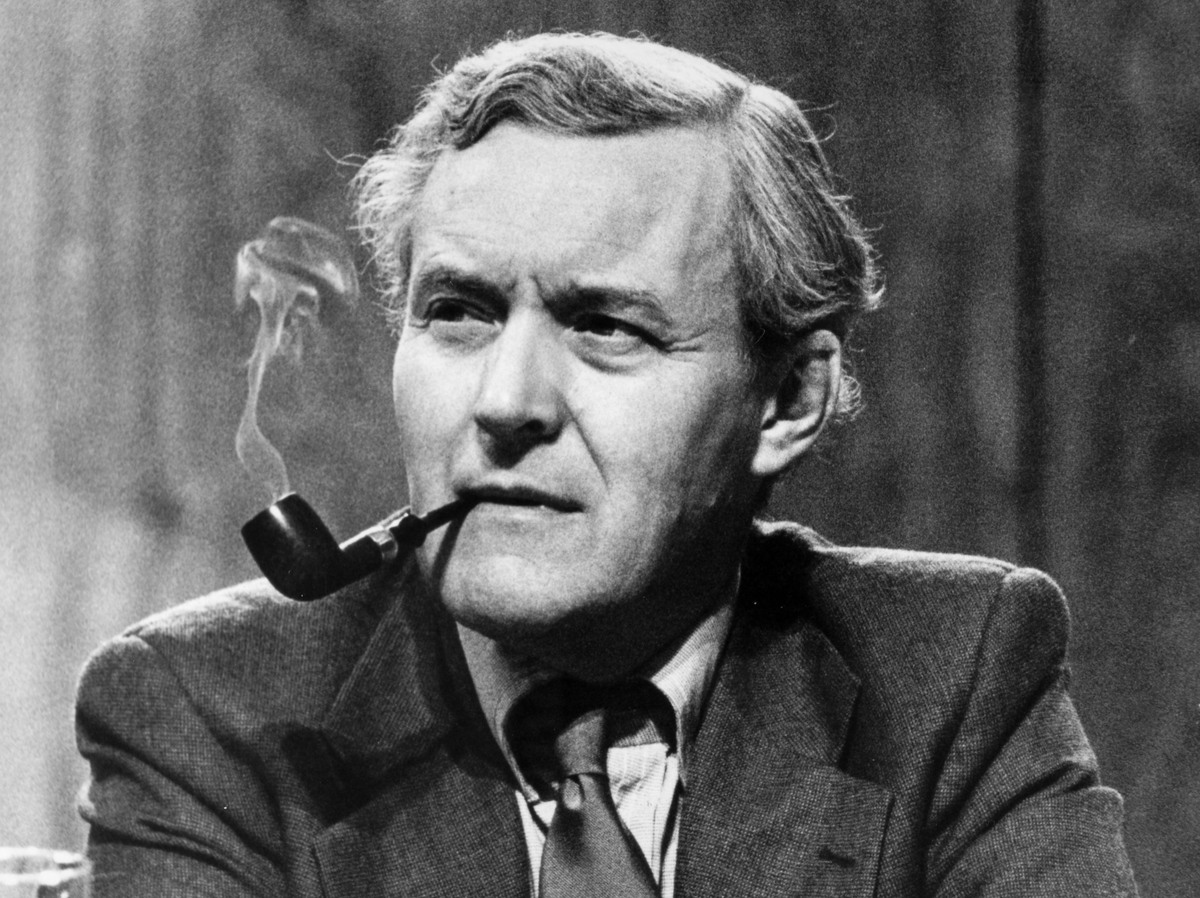
Tony Benn
In 1995 Blair successfully removed Labour’s commitment to ‘common ownership’ from Clause Four of its constitution. But from the Left, Tony Benn protested: ‘Labour’s heart is being cut out’. In a sense Benn was right, common ownership had been Labour’s core principle since 1918, even if no leader since 1945 had made it a primary goal.
Blair hyphenated the word as ‘social-ism’ and attempted to change its meaning. It now meant a recognition of individuals as socially interdependent, the promotion of social justice and of equality of opportunity, recognising the equal worth of each citizen. He also used the term ‘third way’ to describe a path that differed from widespread collectivisation, on the one hand, and unrestrained markets, on the other.
While Blair saw a sizable role for the market, he was not a ‘neoliberal’ or a free-market libertarian. The state was still to play a major role in the economy. But redistributive taxation and the reduction of inequality were not major priorities. Blair’s close ally Peter Mandelson declared in 1998 that the Labour Government was ‘intensely relaxed about people getting filthy rich as long as they pay their taxes’.

Thomas Paine
While Blair redefined and retained the word social-ism, he moved Labour closer to a version of social liberalism. There is a radical tradition of social liberalism, but it is not socialist in the sense of widespread common ownership. The good of the community is seen as harmonious with the freedom of the individual. This tradition stretches from Thomas Paine through John Stuart Mill to Thomas H. Green, John A. Hobson and others.
From Paine onwards, social liberals raised concerns about inequalities of wealth and power. They appreciated the complexity of decision-making and the potential fallibility of government. Hence they advocated flexibility: there was a need for policy experiments and ongoing appraisals. Institutional checks and balances were required. But for Blair it was all about ‘values’, not structures or institutions.
Labour’s nostalgic devotion to the word socialism was too strong. With or without the hyphen, social-ism had become a zombie-term – a mere badge of identity. Labour was still stuck in its old rhetoric and unable to learn much from the broad liberal tradition.
Blairism as Marxism turned Upside-Down
The relationship between means and ends is important. Marxism famously separates ends from means, claiming that ‘the ends justify the means’. For Marxism, all means are evaluated solely in terms of the ends that they are deemed to serve. But in a complex world, we cannot be sure that specific means will lead to their assumed ends. Hence, contrary to Marxism, means must be placed under moral constraints as well.

Karl Marx
Blair argued that the emphasis on common ownership or nationalization confused means with ends. The ends of social harmony and social justice, for example, might be achieved by means other than common ownership. Ironically, by separating means and ends so completely, Blair mirrored Marxism. Blair used a Marx-like separation of ends from means to abandon classical socialist aims.
But means and ends cannot be completely separated. The American philosopher John Dewey pointed out that the pursuit of goal is itself a learning process that can modify our ends. Furthermore, the use of particular means might modify our ends, as we discover unforeseen problems or benefits. Furthermore, the end we uphold is a spur to action, hence also a means of energizing change. Dewey wrote: ‘there is no end which is not in turn a means’.
Blair adopted another dichotomy from Marxism. This is the separation of the sphere of ‘values and beliefs’ from economic structures and patterns of ownership. This is redolent of Marx’s distinction between the ideological ‘superstructure’ and the ‘economic base’. But Blair reversed their importance: for him ‘values and beliefs’ assumed primacy. Adopting the same dichotomy, Marxism was turned upside-down.
This Marxist dichotomy is false. All economic activity involves beliefs, evaluations and value-laden motivations. Values and beliefs are intrinsic to the economy. The economy is not a machine that can be considered separately from the knowledge, beliefs and expectations of the human agents within it.
Blair in Power: From Achievement to Catastrophe
Blair’s highly charismatic and effective leadership led to the electoral landslide of 1997. Labour’s share of the vote jumped from 34.4 per cent in 1992 to 43.2 per cent in 1997. Especially in the early years, his government achieved a great deal. Education and the National Health Service benefitted for large increases in spending.
One of the first major achievements of Blair’s government was the Good Friday Peace Agreement in Northern Ireland. A minimum wage was introduced and devolved assemblies were set up in Scotland and Wales. The Human Rights Act was passed in 1998, but the Blair government was later accused of complicity in human rights abuses abroad. There was important legislation in pursuit of gay rights. Child and pensioner poverty were dramatically reduced. There was continuous economic growth. Many more people were brought into employment.
Blair won another landslide election in 2001. Demonstrably, by a wide margin, he had made Labour electable, after the wilderness of the Thatcher era. But he did not offer Labour a new philosophy or a robust architecture, after the abandonment of traditional socialism and the decline of its trade union base. Even before Iraq, some of his new policies were challengeable.
 For example, Blair’s emphasis on ‘values and beliefs’ over institutional structures allowed him to privatize some public services, including parts of the National Health Service. His claim was that the same esteemed values could endure within any system of ownership. But changes to institutional structures affect the habits and beliefs of those involved. Extending the scope for contracts and markets means – rightly or wrongly – that pecuniary and profit-orientated values can become more pervasive, unless checks are put in place.
For example, Blair’s emphasis on ‘values and beliefs’ over institutional structures allowed him to privatize some public services, including parts of the National Health Service. His claim was that the same esteemed values could endure within any system of ownership. But changes to institutional structures affect the habits and beliefs of those involved. Extending the scope for contracts and markets means – rightly or wrongly – that pecuniary and profit-orientated values can become more pervasive, unless checks are put in place.
Consistent with his emphasis on ‘values and beliefs’, Blair promoted a programme of expansion of publicly-funded faith schools. But religious faiths are not simply ‘values’: they are organised enclaves of group self-protection and survival. As already evident from the long experience of segregation in Northern Ireland, institutionalised separation can exacerbate political, ethnic and cultural divisions.
A 2001 report commissioned by Bradford City Council concluded that its communities were becoming increasingly isolated along racial, cultural and religious lines, and that faith-segregated schools were fuelling the divisions. Major riots erupted that year in Bradford and other northern cities.
 David Bell – the then Chief Inspector of Schools – warned in a January 2005 speech to the Hansard Society that a traditional Islamic education did not equip Muslim children for living in modern Britain. He said: ‘I worry that many young people are being educated in faith-based schools, with little appreciation of their wider responsibilities and obligations to British society.’ In another lecture Bell said: ‘We can choose … whether we want to bring our diversity together in a single rainbow or whether we allow our differences to fester into separate cultures and separate communities.’ Yet, even after the July 2005 London bombings by home-grown Islamic extremists, and until his resignation from office in 2007, Prime Minister Blair continued to promote faith schools.1
David Bell – the then Chief Inspector of Schools – warned in a January 2005 speech to the Hansard Society that a traditional Islamic education did not equip Muslim children for living in modern Britain. He said: ‘I worry that many young people are being educated in faith-based schools, with little appreciation of their wider responsibilities and obligations to British society.’ In another lecture Bell said: ‘We can choose … whether we want to bring our diversity together in a single rainbow or whether we allow our differences to fester into separate cultures and separate communities.’ Yet, even after the July 2005 London bombings by home-grown Islamic extremists, and until his resignation from office in 2007, Prime Minister Blair continued to promote faith schools.1
Blair’s government reduced the number of heredity peers in the House of Lords, but dithered on further reform. Whether the House of Lords should be fully appointed, fully elected, or be subject to a combination of the two remained under dispute. Blair worried that the House of Lords might impair the will of the Commons – institutionalised checks and balances were not central to his thinking.
Then there was the catastrophe of the 2003 invasion of Iraq. Blair was over-confident that his ‘values’ could prevail, and President George W. Bush could be persuaded to seek United Nations approval. But these ‘values’ were no match for a belligerent Republican Party.
Of dubious legality, this bloody disaster wrecked Blair’s political career. Deadly strife in Iraq continues to this day, with enduring political reverberations in the UK.
 Blair’s motivation for his decision to support Bush’s invasion will be the subject of many biographies and histories to come. The explanation is bound to be complex, but I guess that Blair’s supreme emphasis on ‘values’ over legalities, structures, evidence, fallibilities and practicalities will be uppermost. How else could someone believe in the possibility that Western democratic ideals could quickly take hold in an artificially-created country with no democratic history, riven by ethnic and religious division and fragmented into countless clans?
Blair’s motivation for his decision to support Bush’s invasion will be the subject of many biographies and histories to come. The explanation is bound to be complex, but I guess that Blair’s supreme emphasis on ‘values’ over legalities, structures, evidence, fallibilities and practicalities will be uppermost. How else could someone believe in the possibility that Western democratic ideals could quickly take hold in an artificially-created country with no democratic history, riven by ethnic and religious division and fragmented into countless clans?
Blair was an outstanding politician: he restored Labour’s electability and won three major victories in succession. But when he stepped down from office in 2007 he left an ideological as well as a charismatic vacuum. Labour retained the term socialism, but in substance Blair moved Labour toward an untutored version of reforming liberalism. Largely because of the damage to Blair’s reputation after Iraq, the party was unable to digest this ideological shift.
Blair compounded a problem faced by social democratic parties throughout the world. To a large extent they have lost their way, lacking a well-developed ideology with related, viable goals.
The Corbyn Restoration: Marxism-Leninism Revived
After Blair’s exit, the theoretical, ideological and charismatic void helps to explain why the Labour Party eventually choose the retro-Marxist Jeremy Corbyn as its leader.2 Furthermore, the weakened trade unions were no longer a moderating force: the flywheel had been dismantled. Constitutional changes had given them less power within Labour’s structure and the power they retained had been moved by internal changes to the Left.
The financial crash of 2008 undermined Labour’s reputation for sound finance. When Gordon Brown was Labour Chancellor under Blair, he promoted significant deregulation of the financial sector. After the debt bubble burst, and Western capitalism teetered on the edge of collapse, there was a widespread resurgence of Marxist thinking.
Corbyn turned the clock back, returning to socialism in its original meaning. The goal of common ownership was restored. His semi-Marxist, Bennite socialism was combined with a quasi-Leninist foreign policy. Opposed to the invasions of Afghanistan and Iraq, and to the oppressive treatment of Palestinians by Israel, Corbyn’s foreign policy became systematically anti-West. Corbyn turned Marxism the right way up.
 As if oblivious to the enormous changes in world capitalism, Corbyn clings to an ideology made in 1918. There is neither strategy, detail nor appraisal of feasibilty, to his thinking. All that is left is his ‘values’: his outrage and protest against forces from the West that inflict suffering on the world. There is no mention of the many millions that have died under regimes that were ‘Marxist-Leninist’ by name.
As if oblivious to the enormous changes in world capitalism, Corbyn clings to an ideology made in 1918. There is neither strategy, detail nor appraisal of feasibilty, to his thinking. All that is left is his ‘values’: his outrage and protest against forces from the West that inflict suffering on the world. There is no mention of the many millions that have died under regimes that were ‘Marxist-Leninist’ by name.
Although very different from Blair’s, Corbyn’s ideology faces the same problem of dealing with the potential fallibility of all decisions and policies. Both Blair and Corbyn proceeded as if they had the uncontroversial right answer to any problem. Yet the complexity of the modern world underlines the need for an experimental approach to policy, and for countervailing institutional structures to appraise every move.
Unlike Blair, Corbyn believes that these problems can be solved by large doses of democracy and popular involvement. But he overlooks the problems and dangers of undetailed ultra-democracy. Widespread democratic involvement in the myriad of intricate decisions in a complex politico-economic system is unworkable.
While Blair after 2003 carried the scars of Iraq, Corbyn is on record in his support for terrorist organisations such as Hamas, Hezbollah and the IRA. He has claimed that he was engaging in the peace processes in these theatres of combat. But there was no visible negotiation with the other sides in these conflicts. Corbyn has also given speeches supporting Colonel Muammar Gaddaffi’s regime in Libya and Slobodan Milosevic, the butcher of Bosnian Muslims. Corbyn’s behaviour was more consistent with an ‘anti-imperialist’ and anti-West Leninist than with a broker for peace.
In 1918, Labour first established individual party membership and the ‘common ownership’ Clause Four was first placed in its constitution. Corbyn’s Leninism would take us back to the year after Lenin and the Bolsheviks seized power in Russia. Momentum yes – but backwards in time. Over a hundred years of hard work by millions of activists, building Labour as a political movement and as a party of government, will be reversed.
Corbyn’s political brew has little chance of success. But we should understand the unwitting role of Blair in helping to prepare the ground for its ascendancy within the Labour machine.
Conclusion: Beginning Again
Values are important, but we need more than that. While conservatives can nod in favour of the status quo, radicals must offer a distinctive vision for change – they have to outline the kind of future they want. A movement to change the world must uphold its aims and recruit to its cause.
Changed under Blair’s leadership, the current Labour Party Constitution outlines commendable principles such as by ‘common endeavour we achieve more than we achieve alone’. It laudably aims for a society where ‘power, wealth and opportunity are in the hands of the many not the few’ and ‘where we live together freely, in a spirit of solidarity, tolerance and respect’.
But these words are too vague to provide a clear goal. They are consistent with a range of idealistic plans, from statist socialism to egalitarian ‘people’s capitalism’.
The current Clause Four Part One is silent on the question of property, whether it is to be private or owned in common. Reference to ‘a thriving private sector’ is tucked away in Part Two, alongside a mention of public ownership or accountability where ‘essential to the common good’.
This unmotivated melange satisfies neither traditional socialists who see common ownership as a vital goal, nor liberals who regard some private ownership as one of the preconditions of human freedom. Clause Four is inaudible on these vital institutional questions. ‘Values’ fill the vacuum instead.
Clause Four commendably promotes democracy and human rights, but is unclear about the institutional and politico-economic conditions under which they are nurtured. It does not acknowledge one of the major lessons of the twentieth century, that human rights and traditional socialism have never co-existed, and there are good reasons to conclude that they never will.
The institutional aims of the Labour Party are unclear. There is now a battle for the stricken party’s soul. It will be fought out between traditional socialists and social-democratic modernisers. But it will be a fight over an organisation that has already lost its direction and has no clear way forward. Both Blair and Corbyn bear some responsibility for this crisis.
10 July 2016
Amended: 11-13 July 2016, 18 February 2019.
1 Like Blair, Corbyn also supports faith schools (at least Jewish ones).
2 Pressed by Andrew Marr in July 2015 on whether he was a Marxist, Corbyn ducked the opportunity to deny on television that he held to that view.
Bibliography
Attlee, Clement R. (1937) The Labour Party in Perspective (London: Gollancz).
Bell, David (2005) ‘Full Text of David Bell’s Speech’, The Guardian, 17 January. http://www.theguardian.com/education/2005/jan/17/faithschools.schools
Blair, Tony (1994) Socialism, Fabian Pamphlet 565 (London: Fabian Society).
Bloodworth, James (2015a) ‘A Left-Wing Case against Comrade Jeremy Corbyn’, International Business Times, 4 August. http://www.ibtimes.co.uk/james-bloodworth-left-wing-case-against-comrade-jeremy-corbyn-1513969
Bloodworth, James (2015b) ‘Why is No One Asking About Jeremy Corbyn’s worrying connections?’ The Guardian, 13 August. https://www.theguardian.com/commentisfree/2015/aug/13/jeremy-corbyn-labour-leadership-foreign-policy-antisemitism
Bloodworth, James (2015c) ‘The Bizarre World of Jeremy Corbyn and Stop the War’, Politico, 12 November. http://www.politico.eu/article/bizarre-world-of-jeremy-corbyn-and-stop-the-war-coalition-galloway-rees-iraq-far-left/
Boffey, Daniel (2016a) ‘Hilary Benn Seeks Shadow Cabinet Backing to Oust Corbyn’, The Guardian, 23 June. http://www.theguardian.com/politics/2016/jun/25/hilary-benn-jeremy-corbyn-labour-leadership-eu-referendum-brexit
Boffey, Daniel (2016b) ‘Jeremy Corbyn aides refuse Tom Watson one-on-one meeting’, The Guardian, 3 July. http://www.theguardian.com/politics/2016/jul/02/corbyn-keeps-watson-arms-length
Crosland, C. Anthony R. (1956) The Future of Socialism (London: Jonathan Cape).
Dewey, John (1922) Human Nature and Conduct: An Introduction to Social Psychology (New York: Holt).
Gillard, Derek (2007) Never Mind the Evidence: Blair’s Obsession with Faith Schools www.educationengland.org.uk/articles/26blairfaith.html.
Lukes, Steven (1985) Marxism and Morality (Oxford: Oxford University Press).
Rentoul, John (1995) ‘“Defining Moment” as Blair wins Backing for Clause IV’, The Independent, 27 April. http://www.independent.co.uk/news/defining-moment-as-blair-wins-backing-for-clause-iv-1611135.html
Trotsky, Leon D., Dewey, John and Novak, George (1979) Their Morals and Ours: Marxist versus Liberal Views on Morality (New York: Pathfinder Press).
Posted in Common ownership, Democracy, Jeremy Corbyn, Labour Party, Left politics, Nationalization, Politics, Socialism, Tony Benn, Tony Blair, Tony Blair
June 30th, 2016 by geoffhodgson1946
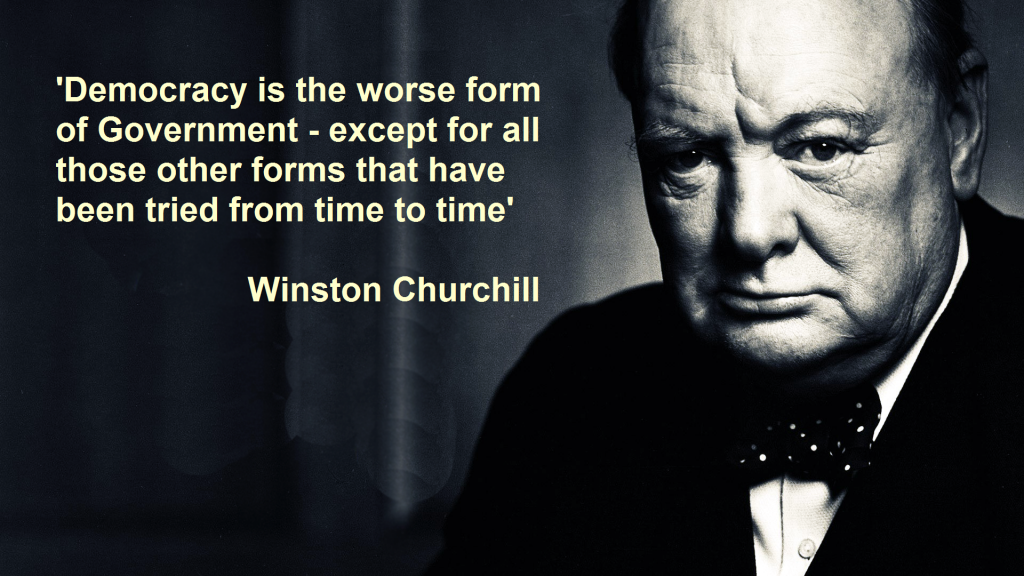
Geoffrey M. Hodgson
UK politics is currently in turmoil, as a result of the vote for Brexit on 23 June 2016. Should a narrow referendum result be implemented by the government, or should Parliament alone make the final decision? The constitutional position is that Parliament is sovereign. But many insist that even a narrow result should automatically be respected. To do anything else would be ‘undemocratic’ – and therefore wrong.
Within days of the referendum, the Parliamentary Labour Party passed a decisive vote of no confidence in Jeremy Corbyn as its leader.
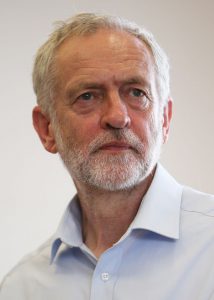
Jeremy Corbyn
Corbyn is a ‘democratic socialist’, believing in a large public sector under some form of ‘democratic control’. His speeches and writings are silent on the detail on how this would work. We find a tiny bit more in the publications of his late mentor – Tony Benn. Benn argued that the essence of socialism was democracy, not simply in parliament, but in the economy and all civic life.
This is not a new idea. Vladimir Lenin wrote in 1917 in his State and Revolution of ‘an immense expansion of democracy’ (which of course was the reverse of what actually happened after he seized power).
G. D. H. Cole was a Fabian and Labour Party socialist. His vision of ‘guild socialism’ was of an integrated, national system where ‘a single authority is responsible both for the planning of the social production as a whole and for the distribution of the incomes which will be used in buying it.’ Within this ‘single authority’ he also sought devolved worker control, where groups of individuals would make democratic decisions on how production was organised and products were distributed.

Tony Benn
The superficial attraction of this kind of thinking is immediate. The Corbyns of today, the Benns of yesterday and the Coles of the day before, all pointed to the towering concentrations of capitalist power and wealth that overshadow the festering estates of the poor. ‘Make it all democratic’ they say, ‘let the public own, and decide upon, what is to be done with the banks, railways, enterprises, and all the rest. This is just democracy in action.’
But there are grounds to hesitate. Leaving aside the issue of public ownership, democracy is not a solution to every problem. Furthermore, there are logical, practical and even ethical arguments against an indefinite extension of democracy. There are very good reasons to be in favour of democratic government. But the limits to democracy should also be acknowledged.
Absolutism refers to a form of undemocratic and unaccountable government. Absolutism also refers to the idea that a principle or standard should be all-encompassing or supreme. In the latter sense, some people are democratic absolutists. I offer an explanation why they are wrong. If you feel uncomfortable with this ironic conjunction of meanings, then you may substitute with something like ‘ultra-democracy’ instead.
First I outline some well-known logical problems with ultra-democracy (you may skip this section if you are more interested in practicalities). I then point to some practical problems with ultra-democracy. I end up defending representative democracy.
Logical problems with democracy
It is very easy to show that the absolute democratisation of every important decision is impossible. A decision cannot be made democratically without prior rules on how the vote is to be conducted. How is the proposal tabled? Who can vote? What system of voting is used? Can the proposal be amended? And so on.
That is why states or organisations have constitutions or standing orders, which hopefully can deal with these issues. Some of these ground rules – such as the constitution itself – may have previously been put to the vote. But then too some rules were assumed, concerning the way that vote was conducted. Often the choice of those rules were crucial for the outcome. But it is logically impossible to have a vote on every prior rule that is necessary for a vote to take place. It’s an example of an infinite regress.
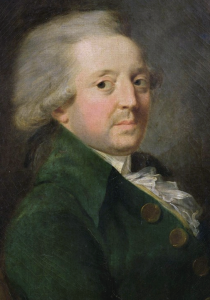
Nicolas de Condorcet
Another intractable logical problem is the paradox of voting, as first explained by the French revolutionary Nicolas de Condorcet (1743-1794). Condorcet showed that while individuals themselves may have consistent preferences over different outcomes, when brought together in a population the collective expressions of those preferences may be inconsistent. Jonathan Portes has illustrated this neatly in the Brexit case. Attempts to deal with this problem – such as two-stage voting, as in French Presidential elections – are both fallible and dependent on prior choices of rules.
There is also the Arrow impossibility theorem, named after the Nobel economist Kenneth Arrow. His theorem states that no rank-order voting system can be designed that always satisfies these three reasonable criteria of fairness. I do not need to go into further details here. The overall point is that all attempts to implement democracy are inevitably incomplete, involve prior assumptions that cannot be voted upon, and may violate some principles of consistency or fairness.
Practical problems with ultra-democracy
Major practical problems with ultra-democracy stem from the complexity and scale of modern society. A small club or group can run things relatively easily. But even then, special skills are required, such as being able to keep accounts or chair meetings.
Making decisions and managing human interactions in a large-scale society is immensely more complex. Personal familiarity and trust remain vital at the family and small community level, but with decisions involving thousands and millions of people, something else is required. There has to be some kind of government, of one kind or another, based on some form of authority.
Consider the ‘democratic control’ of industry, favoured by Cole, Benn and Corbyn. Worker cooperatives are a workable and meritorious alternative to capitalist corporations. But even here, only a tiny proportion of decisions can be delegated to ballots or mass meetings. The complex processes and technologies of production have to be broken up into manageable units. The advice of experts has to be relied upon.
In addition, a lot of decision-making has to be devolved. We are no longer a world where the role of an office secretary is simply to take down shorthand and type it out. A great deal of work involves processing information and making judgements, even at lower management levels. Think how many small judgements are made at work each day. It would be impossible to be ‘democratic’ and put them to the vote.
Greater industrial democracy, with worker participation in some workplace decisions, can improve productivity and make work more enjoyable. Moves in this direction are important and valuable. But it is impractical to have votes on more than a tiny fraction of the important decisions that have to take place every day in any large, complex economy.
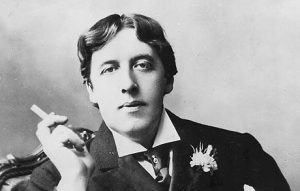
Oscar Wilde
Everyone’s participation in every major decision, even if limited to a town or region, would be a crushing burden of endless decision-making on every citizen. It would guarantee economic paralysis. Oscar Wilde was right: socialism is impossible because it would take too many meetings.
Supporters of an ultra-democratic society, where individuals make decisions throughout industry as well as the polity, fail to consider the problems of relevant knowledge and the sheer number of meetings and decisions involved. That is why, contrary to the claims of many socialist ultra-democrats, private ownership and control are necessary to a large degree, so that producers and consumers can make decisions (within legal limits) through contracts and markets, unencumbered by local or national committees and their inevitable bureaucracies.
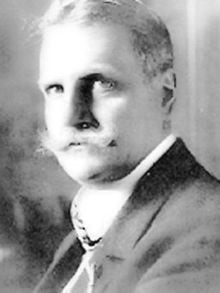
Robert Michels
Robert Michels (1876-1936) was a student of Max Weber. He argued persuasively that full democratic control was impossible in large-scale, complex organizations. For individuals to coordinate and act together, sizeable organizations need leaders, who then delegate administrative tasks to complex bureaucracies. Leaders and bureaucrats manage information flows between members of the organization. They develop skills, and acquire expertise and knowledge, that are peculiar to their roles. Knowledge is specialized, and the management of information has unavoidably to be selective. It is impossible for everyone to become a specialist in more than a few areas, or to take account of every piece of information in the organization. Inevitably, this leads to oligarchy, with some power shifting away from individuals at the base.
Michels underlined the oligarchic distribution of knowledge and power in large, complex organizations. Because of localized knowledge, specialisms, complexities, and massive amounts of information, a direct democracy, where everyone votes on everything, is not viable. It is impossible to involve everyone in every significant decision. Michels argued in detail that ‘the principle cause of oligarchy in the democratic parties is to be found in the technical indispensability of leadership.’
The moral limits to democracy
Many Left politicians emphasize the importance of human rights. This is no less true of Tony Benn or Jeremy Corbyn. The specification and justification of those rights are controversial. But the majestic modern statement is the United Nations Universal Declaration of Human Rights of 1948. It proclaims inalienable rights including freedom of expression, freedom of worship, freedom from torture, and so on. It also includes the right to own private property, which may be an anathema for some socialists, but can be justified on the grounds of the right to resources for self-development and autonomy.

John Adams
We may disagree on what should or should not be included on the list of universal human rights, but as long as we accept the veracity of any such list, then there is a problem for ultra-democracy. Two principles collide: the ultra-democratic maxim that if possible issues should be decided by a vote, and the idea that human rights are inalienable and may not be countered by any political power, democratic or otherwise. On this basis, some democratic votes can be immoral, such as a resolution to suspend important rights in the event of a national emergency.
As the American politician John Adams (1735-1826) pointed out, the rule of the majority can be abused to counter the rights or legitimate interests of minorities. That is one reason why universal human rights are important: their assertion protects minorities suffering illegitimate discrimination in the hands of majorities. Ultra-democracy opens the door for unwarranted discrimination and the disregard for rights. For democracy to work well, all powerful parties and interest groups must recognise its limits.
In principle, if sometimes not in practice, rights are protected by courts, including supreme courts whose role is to safeguard individual rights and the constitution. Courts are there to prevent democratic decisions countering human rights or breaking existing laws. It is even possible that the Brexit referendum was illegal, and the decision of the majority could be legally overturned.
Why democracy is essential
The most important reason for democracy is the legitimation of political power. Prior to the modern era, the authority of a tribal chief or a national monarch was legitimated by religion, myth, tradition, family descent, combat, or some combination of these. The rationalism of the Enlightenment changed all that. The English Levellers, the American Revolutionaries and the French Jacobins all sought to replace hereditary monarchies, which had been legitimised by religion. Instead there would be parliamentary system, with delegates elected from the population of adult males. The claim for legitimacy would be popular mandate, based on the male heads of households.
|
My forthcoming book elaborates on some of the political issues raised in this blog:
Wrong Turnings: How the Left Got Lost
To be published by University of Chicago Press in November 2017
|
Of course, the major deficit here was the denial of votes to women, which was not widely recognised as an important omission until the second half of the nineteenth century. (Incidentally, the Marquis de Condorcet – mentioned above – was a very early advocate of female suffrage.) Neither the Levellers nor the Jacobins thought ‘servants’ (i.e. employees) should have the right to vote. Different American states had different rules, but property qualifications for voting were widespread. In practice, Native Americans and many African Americans could not vote until 1924 and 1965 respectively.
These extensions in the franchise reflected human rights. These were the ideological and moral forces behind the extension of the franchise. Often, the existing institutions of limited democracy were insufficient to establish these rights. Change came through crisis, protest, violence or war, with movements under the banners of universal rights.
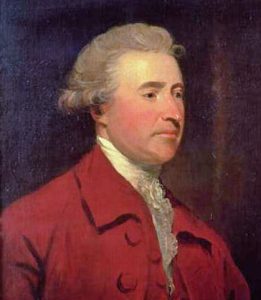
Edmund Burke
The Enlightenment gave us the principle of universal rights, and the notion of political sovereignty based on a democratic mandate from the masses. But many contemporary thinkers were aware of the problems involved. Charles-Louis Montesquieu (1689-1755) stressed the importance of checks and balances in the political system. Edmund Burke (1729-1797) argued that a polity should recognise the wisdom of tradition, as well as the carefully-applied and well-informed guidance of reason.
Burke was astutely aware of the complexities and uncertainties involved in governance. He stressed that members of parliament were there to uphold the interests of the nation as a whole. Decisions had to be reached through detailed discussion and expert advice. Members of parliament were not delegates, to be mandated through the expressed opinions of their constituents.

Thomas Paine
The great radical thinker Thomas Paine (1737-1809) also understood that in larger societies, direct and complete participatory democracy is impossible. Problems of complexity, scale and location place severe limits on democratic involvement. Given the impracticalities of large-scale direct democracy, nations should adopt systems of representative democracy, relying on professional and trained experts in government offices. Paine would have also rejected the ultra-democratic dreamings of some socialists, including Benn and Corbyn.
By contrast, Tony Benn argued that Labour Party Members of Parliament should be mandated by their constituency parties. Corbyn has gone even further in this direction, proposing that party members should dictate policy to their MPs. This undermines a central principle of parliamentary democracy. An important reason for a parliament is that it provides a forum where proposals may be debated, expert advice may be heard and details amended.
The idea that MPs should simply represent the will of their constituents, or be instructed by their local constituency parties, would make parliament redundant. Instead we could all watch television, and as in a game show, express our preferences on every issue, from capital punishment to the expulsion of immigrants. This easily could steam-roller over human rights, and through manipulation serve a dictatorship.
Within a system of representative or parliamentary democracy it is possible to make a case for or against referendums on important issues. In Switzerland referendums are common. Their origins there are in the nineteenth century, where there was a need to keep together a country highly fractured on linguistic, religious and political lines.
Opponents of referendums argue that they can weaken representative democracy. They can be used by the party in power to resolve its internal disputes, or to abdicate responsibility over a difficult decision. The idea that a referendum should be more than advisory rests on a notion of direct rather than representative democracy, and assumes that a large number of voters have the capacity to make an informed decision, untainted by (say) a biased mass media or demagogic leaders. Hence some democratic countries – notably Germany – have legal provisions to limit the use of referendums at the national level.
Conclusion
The current political crisis in the UK has made the nature and role of democracy key issues for discussion and clarification. My first argument here that a leftist strain of ultra-democratic thinking – from Lenin to Corbyn – is untenable. I also argue that democracy and human rights can come into conflict, and when they do the former should submit to the latter.
Ultra-democracy cannot work. Through the frustration of endless committees and meetings, and the collapse of productive activity, attempts to move in this direction would lead to crisis. Unworkable plans for ultra-democracy would both raise and disappoint expectations, leading to the impatience of all, and a likely authoritarian reaction. The road to hell is paved with good intentions.
There are strong practical and moral reasons to support representative democracy, particularly as a means of legitimising government power. The key proviso is that a government should be in principle removable by the electorate – not that the electorate should be the government.
There is strong evidence that representative-democratic systems, where there is some protection of human rights, can reduce the risks of famine and war. Evidence also suggests that democracy may also help economic development, at least for those countries above relatively low levels of output per capita.
I leave it to the reader to deliberate on the pros and cons of holding referendums. The Brexit experience has been illuminating, at least in that regard.
When the Brexit outcome was announced on 24 June, Corbyn immediately declared that the government should take Britain out of the European Union. He was being consistent with his dangerous view that politicians should carry out the orders of the electorate, irrespective of the slim Brexit majority and the lies and false promises in the debate.
30 June 2016
Bibliography
Arrow, Kenneth J. (1951) Social Choice and Individual Values (New York: Wiley).
Benn, Tony (1979) Arguments for Socialism (London: Jonathan Cape).
Benn, Tony (1981) Arguments for Democracy (Harmondsworth: Penguin).
Burke, Edmund (1774) ‘Speech to the Electors of Bristol’. Available on: http://press-pubs.uchicago.edu/founders/documents/v1ch13s7.html
Claeys, Gregory (1989) Thomas Paine: Social and Political Thought (London and New York: Routledge).
Cole, George D. H. (1920) Guild Socialism Re-Stated (London: Parsons).
Michels, Robert (1915) Political Parties: A Sociological Study of Oligarchical Tendencies of Modern Democracy (New York: Hearst).
Polan, Anthony J. (1984) Lenin and the End of Politics (London: Methuen).
Portes, Jonathan (2016) ‘The Condorcet Paradox at Work? Rock-Paper-Scissors in the EU Referendum’, 6 June. http://www.niesr.ac.uk/blog/condorcet-paradox-work-rock-paper-scissors-eu-referendum#.V3IpwU1TF9A
Waldron, Jeremy (1988) The Right to Private Property (Oxford and New York: Oxford University Press).
Wilde, Oscar (2000) Oscar Wilde: A Life in Quotes, ed. Barry Day (London: Metro).
Posted in Brexit, Democracy, Jeremy Corbyn, Uncategorized
June 5th, 2016 by geoffhodgson1946
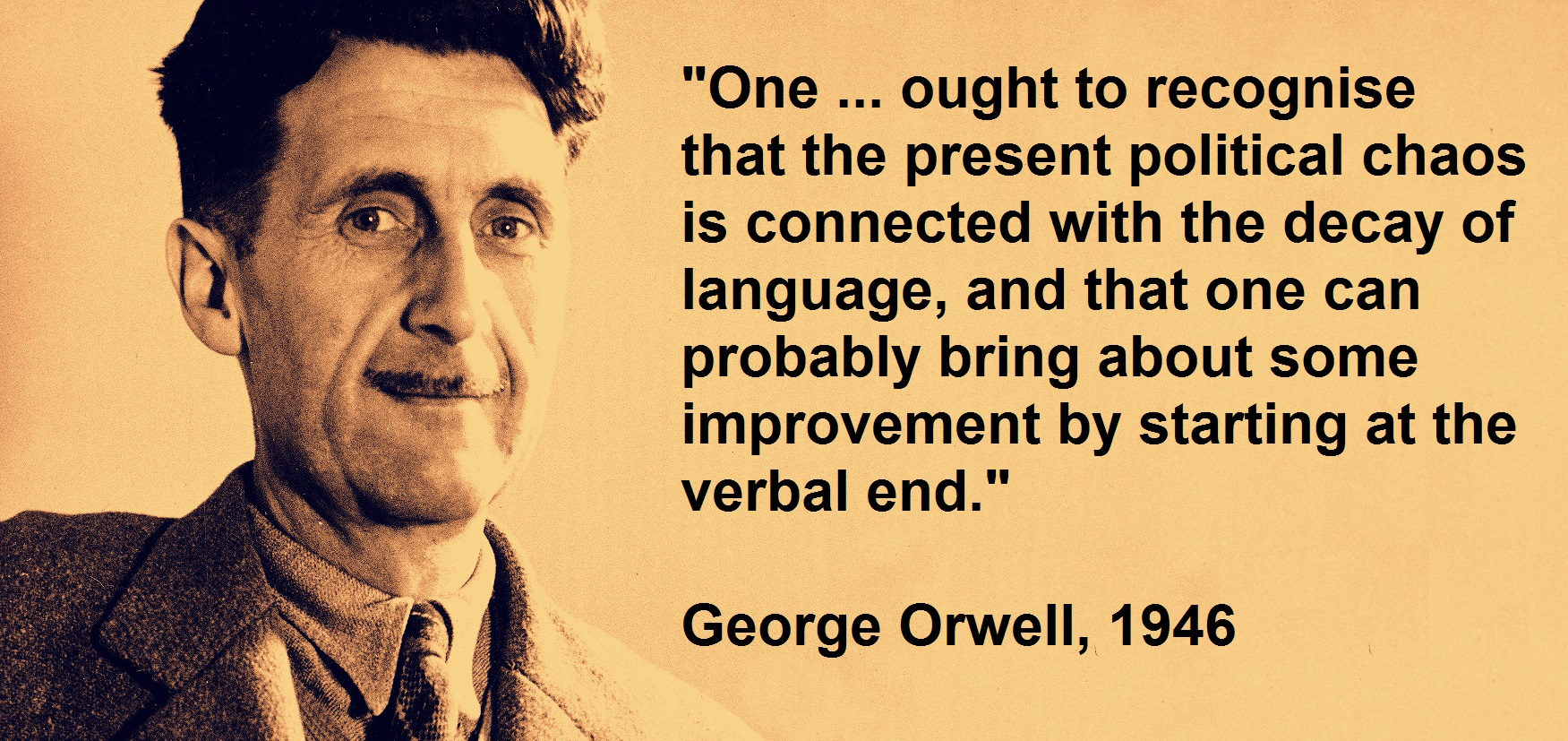
Geoffrey M. Hodgson
The terms Left and Right have become ambiguous and self-contradictory. Today the term ‘right-wing’ is applied to diverse and opposed views such as the following:
♦ Those who favour private ownership and markets are often placed on the political Right, including those who are strong supporters of democracy and human rights.
♦ Those who put private property above everything, and care less about democracy, are also described as Right.
♦ Pro-market libertarians, who are so strongly against states that they oppose wars, are also described as Right.
♦ Nationalists that venerate the national state are also described as Right, even if they support democracy and individual rights.
♦ Fascists and racists are also seen as Right, including those who would pursue wars and would limit individual freedoms or rights
Hence the debased term Right now covers democrats and despots, peace-mongers and war-mongers, nationalists and individualists, and defenders and opponents of human rights. There is nothing about private ownership and markets that necessarily implies racism or belligerent nationalism. Yet these different things are conflated under the same label.
The word Left has also slipped into various contradictory usages:
♦ Advocates of substantial state intervention in the economy, typically with some planning and nationalized enterprises, are described as Left.
♦ Advocates of a minimal state, with autonomous communes instead of nationalized industry, are also described as Left.
♦ People who care less about democracy or liberty, and much more about public ownership, national planning or the abolition of poverty, are often described as Left.
♦ Champions of extended democracy, decentralization, popular sovereignty, individual liberty and freedom of expression are often described as Left.
Accordingly, the term Left is now applied to both statist centralizers and communitarian decentralizers, to both totalitarians and ultra-democrats, and to both minimizers and maximizers of liberty.
 Both the Left and the Right have advocated forms of collectivism. The word fascism derives from its symbolic use of the fasces of Ancient Rome, with rods bound together to signify collective strength. Fascism subjected individualism to the collective whole. Similarly, nationalism extols the nation over the individual. If you insist that collectivism is Left, be warned that fascism and nationalism also incline in the same collectivist direction.
Both the Left and the Right have advocated forms of collectivism. The word fascism derives from its symbolic use of the fasces of Ancient Rome, with rods bound together to signify collective strength. Fascism subjected individualism to the collective whole. Similarly, nationalism extols the nation over the individual. If you insist that collectivism is Left, be warned that fascism and nationalism also incline in the same collectivist direction.
Also, as shown below, both the Left and the Right have been aligned with forms of individualism and private property. These terms have become confused and unclear.
The original Left
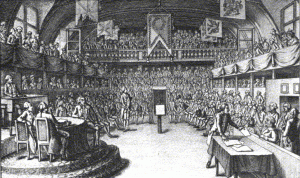 The origins of the political terms Left and Right are in the French Revolution. In 1789, in the National Constituent Assembly, those deputies most critical of the monarchy began to congregate on the seats to the left of the President’s chair. Conservative supporters of the aristocracy and the monarchy would congregate on the right side of the Assembly. The Baron de Gauville explained:
The origins of the political terms Left and Right are in the French Revolution. In 1789, in the National Constituent Assembly, those deputies most critical of the monarchy began to congregate on the seats to the left of the President’s chair. Conservative supporters of the aristocracy and the monarchy would congregate on the right side of the Assembly. The Baron de Gauville explained:
‘We began to recognize each other: those who were loyal to religion and the king took up positions to the right of the chair so as to avoid the shouts, oaths, and indecencies that enjoyed free rein in the opposing camp.’
Those seated to the left of the Constituent Assembly wished to limit the powers of the monarchy, and eventually to create a democratic republic.
Those on the right wished to maintain the authority of the Crown by means of a royal veto, to preserve some rights of the aristocracy, to have an unelected upper house, and to maintain major property and tax qualifications for voting.
By contrast, the Left demanded an end to aristocratic privileges, limitations to the power and privileges of the church, a single-chamber legislature in which all power rested with democratically elected representatives, and a broad popular – but wholly male – franchise.
 In 1789, Jacobin Clubs sprung up all over France. Originally the Jacobin Clubs were an inclusive forum for all revolutionaries; people later described as Girondins and Montagnards were among their number.
In 1789, Jacobin Clubs sprung up all over France. Originally the Jacobin Clubs were an inclusive forum for all revolutionaries; people later described as Girondins and Montagnards were among their number.
The Girondins acquired that name because a number of them came from the départment of the Gironde. The Montagnards were a radical faction within the Jacobins: they took their name from their occupation of the higher seats behind the President of the Assembly.
By 1791 the Jacobin Clubs were dominated by Girondin intellectuals and orators. Hence Girondins such as Jacques-Pierre Brissot and Thomas Paine were also Jacobins.
At least from 1789 to 1792, when the label was most inclusive, the Jacobins as a whole were the Left. Like other radical Enlightenment thinkers, they believed that ideal governments were founded on natural rights and by the will of the people, rather than on religion or tradition.
Accordingly, the Left and Right divided on the question of the legitimate source of authority for government, and on the question of universal and equal human rights. To be Left was to reject aristocracy or religion as sources of authority, and instead claim authority in the will of the people.
The Girondins and the Jacobins supported the use of force to defend the gains of the Revolution and took an aggressive stance against hostile foreign powers. More militant Jacobins argued for suspensions of democratic powers to facilitate a more rapid purging of feudal or aristocratic powers. Some supported the execution of the King, despite a prominent earlier Jacobin sentiment in favour of the total abolition of the death penalty.
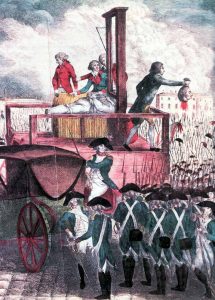 The Girondins had a majority in the National Convention; they controlled the executive council and filled the ministries. But the Montagnards controlled vital Parisian institutions including its National Guard.
The Girondins had a majority in the National Convention; they controlled the executive council and filled the ministries. But the Montagnards controlled vital Parisian institutions including its National Guard.
On 2 June 1793 the Parisian National Guard was deployed to purge the National Convention of the Girondins. Most leading Girondins were imprisoned and executed, and thus began the Reign of Terror, with many thousands of killings by the guillotines, militias or mobs.
After the coup against the Girondins, the term Jacobin acquired a narrower meaning, connoting vigorous, uncompromising, and violent revolutionary action, in line with the Montagnards.
What the Left was not
If energy and determination are Left, then the Montagnards were to the Left of the Girondins. But degrees of fanaticism, activism and violence are poor criteria to differentiate political doctrines. We should be concerned more with the nature of an ideology than the manner it is pursued or expressed.
 A prominent attempt to delineate Left from Right was proposed by David Caute in his popular volume The Left in Europe since 1789. Caute argued that the defining and enduring feature of the Left is its advocacy of popular sovereignty, against the supremacy of the monarchy and the church, as upheld by the Right.
A prominent attempt to delineate Left from Right was proposed by David Caute in his popular volume The Left in Europe since 1789. Caute argued that the defining and enduring feature of the Left is its advocacy of popular sovereignty, against the supremacy of the monarchy and the church, as upheld by the Right.
Caute depicted Maximilien Robespierre as the main campaigner for universal suffrage. For Caute, ‘the Left in 1793 constituted those to the left of the Girondins.’ He wrote of the ‘moderate liberal’ Girondins and the ‘radical democratic’ Jacobins. But Caute’s claims are easily refuted.
Consider two influential Girondins. Jacques-Pierre Brissot played such a central role among the Girondins that for a while their whole group were called Brissotins. Before 1789, in advance of Robespierre, Brissot advocated a democratic republic in France. He argued against electoral qualifications based on income or property and instead proposed a representative government based on universal male suffrage. This then became Jacobin orthodoxy. Brissot also took the abolitionist lead in campaigning against slavery.

Nicolas de Condorcet
Nicolas de Condorcet was another leading abolitionist and also aligned with the Girondins. Condorcet was one of the first few advocates of female suffrage. He was not followed by Robespierre in that respect.
Contrary to Caute’s depiction, the prominent examples of Brissot and Condorcet show that leading Girondins were earlier and more inclusive in their proposals for a democratic franchise than Robespierre. The Girondins as a whole were no less radical in their democratic aims than Robespierre and other Jacobins.
Generally, the Girondins argued against the suspension of democratic powers. By contrast, Robespierre and other Montagnards were more willing to suspend democracy in times of alleged emergency.
Otherwise, in terms of ends (but not means) there was little to distinguish between Brissot, Condorcet and other Girondins, on the one hand, and Robespierre and other Montagnards, on the other.
The original Left and private enterprise
In pre-revolutionary France under King Louis XIV there were numerous corporations, closely tied up with royal power and bureaucracy. The sale of corporate offices provided an important source of royal revenues. In return, numerous corporations and guilds received privileges from the king.
In search of an individualistic utopia, and against the despised institutions of the Ancien Régime, from June 1791 the French revolutionary authorities enacted laws that prohibited organizations of workers, professionals and entrepreneurs, and ended much state regulation of business. Business coalitions, guilds and even business corporations were abolished. Individuals were free to pursue their business interests but forbidden to join together for business purposes.
But this revolutionary experiment in free-market, ultra-individualism was short-lived. There were no civil mechanisms to set standards or codes of conduct. Consequently and necessarily, corporations were later reinstated.
Crucially, from the Girondins to the Montagnards, the Left leaders of the French Revolution advocated an individualistic, property-owning, market economy, just as the English Levellers had done in the 1640s and the American revolutionaries in the 1770s. Under the monarchy, the French revolutionaries had experienced the ill effects of state monopolies and other large agglomerations of economic power. They wanted none of them. They defended private property and private enterprise. As the Fabian socialist R. H. Tawney put it: ‘the dogma of the sanctity of private property was maintained as tenaciously by French Jacobins as by English Tories’.

Gracchus Babeuf
Some see Gracchus Babeuf as the ultimate Leftist of the French Revolution. Babeuf supported the Reign of Terror and was imprisoned in 1794 for his criticism of the group that ended the Terror and executed Robespierre.
After his release from prison in 1795, Babeuf advocated common ownership and the abolition of private property, to be achieved if necessary by the methods of terror. He was the first revolutionary communist of modern times. He aimed at the equal distribution of income and wealth. Babeuf and his followers planned to seize national power, and then rule on behalf of the masses, until the people were educated and deemed able to rule through locally-elected bodies. Babeuf’s conspiracy was uncovered in 1796 and he was then executed.
Babeuf had a point. How could equality of rights, equality under the law, and the abolition of inherited privileges, be squared with the concentrated inheritance of wealth, much of it being a hangover of the feudal era? How could the abolition of feudalism be reconciled with the persistence of such juxtapositions of luxury with squalor?
But by focusing on this problem alone, Babeuf and his followers pushed the revolutionary slogan of equality far beyond the matter of equivalent treatment under the law. They negated several other important rights that the revolution had enshrined, including the rights to individual property and of freedom of expression and assembly.
Although linked with the thinking of the time, the short-lived conspiracy of Babeuf was hardly representative of the Revolution as a whole. While his slogan was absolute equality, the abolition of private property went against prevalent Jacobin opinion. He was a product of the Revolution, but he was not typical of it.
Using Babeuf to establish a Left lineage, is no less absurd than suggesting that mass executions, terror, dictatorship and Bonapartism are all Left. It is more sensible to apply the term Left to the doctrines that prevailed in 1789-1792, rather than to the bloody upheavals and transgressions that followed.
Changing the meanings of Left and Right

Robert Owen
When socialism emerged in the 1830s, with the ideas of Robert Owen and others, it underlined equality and solidarity, but sometimes to the detriment of liberty, autonomy or even democracy. Owen opposed parliamentary democracy, lawyers and legal institutions, and the 1832 Reform Bill. Prominent early socialists wanted rational, harmonious communities, and saw division and debate – in courts or parliaments – as counter-productive. This was the first wrong turning for the post-1789 Left.
In the 1840s, Karl Marx and Frederick Engels joined their version of socialism to the predicted victory of the proletariat in the class struggle, and its expropriation of the capitalist ruling class. In his Socialism: Utopian and Scientific, Engels described the principles and rights of the French Revolution as ‘nothing more than the idealized kingdom of the bourgeoisie’. These principles and rights were sacrificed at the altar of class struggle. This was another wrong turning.
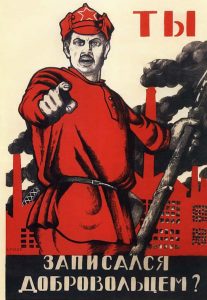 The first Marxist government was established in Russia in 1917, and it quickly evolved into a one-party state. Purges and terror ensued. But many on the left supported the Soviet Regime. The Left label became associated with totalitarianism, with minimal human rights, sham trials, mass executions, limited freedom, and arbitrary confiscations of property. The original meaning of Left was turned upside down.
The first Marxist government was established in Russia in 1917, and it quickly evolved into a one-party state. Purges and terror ensued. But many on the left supported the Soviet Regime. The Left label became associated with totalitarianism, with minimal human rights, sham trials, mass executions, limited freedom, and arbitrary confiscations of property. The original meaning of Left was turned upside down.
As noted above, state-sponsored monopolies were strongly opposed by the French revolutionary Left in 1789. Hence the original Left would have been opposed to the nationalisation of enterprises. For these and other reasons, by the original meaning of the term, there is a case for regarding Stalinism and Maoism as Right.
The term Right has long been linked with authoritarianism, discrimination, the repression of popular sovereignty and the denial of equality under the law. In this vein, it was coupled with the rising fascism of the 1920s and 1930s, in Italy, Germany, Spain and elsewhere. Both Left and Right acquired repressive and authoritarian connotations.

Benito Mussolini & Adolf Hitler
While Marxists since 1848 had wrenched the term Left from its Enlightenment roots, the militant nationalisms and fascisms of the first half of the twentieth century delayed any major shift in the meaning of the word Right. As late as the 1960s it still had strong associations with traditionalism, nationalism, theocracy and fascism. Conservatives in Europe and America supported dictatorships in Latin America, or were apologists for South African Apartheid: these conservatives were appropriately described as Right.
But eventually the term Right also shifted massively, from nationalist and traditionalist apologies for the privileges of aristocracy, to greater advocacy of free markets and private ownership, which ironically had been the territory of the original Left in the French Revolution.
With the collapse of the Keynesian-welfare consensus in the 1970s, a confident free-market neoliberalism took ground. By 1980, some thinkers on the Right had captured a swathe of liberal territory that had been long vacated by the original Left. Both free-marketeers, as well as condoners of dictatorships, were seen as Right.
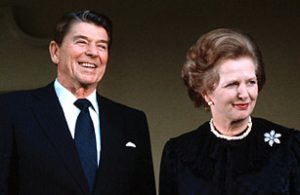
Ronald Reagan & Margaret Thatcher
But many on the Right – including US President Ronald Reagan and UK Prime Minister Margaret Thatcher – were inconsistent in their promotion of individualism and liberty. They championed large corporations. They also supported dictatorships and opposed sanctions against South African Apartheid.
Rightly or wrongly, their claimed free-market views were compromised by their negative attitudes to drugs and prostitution and their devotion to conservative and non-individualistic ‘family values’. But many libertarian advocates of free-markets support democracy and oppose dictatorships.
|
This book by G. M. Hodgson elaborates on some of the political issues raised in this blog:
Wrong Turnings: How the Left Got Lost
Published by the University of Chicago Press in January 2018
|
The abandonment of major ‘socialist’ experiments in China and the Soviet Bloc in the 1980s led to a further seismic shift. Within the Eastern Bloc countries, the rising radicals promoted free enterprise and democracy: they were against the status quo. By contrast, promoters of nationalization and comprehensive planning on the contemporary Left were seen as reactionary defenders of a doomed social order. This bewildered some 1960s radicals from the West, who discovered in the 1990s that the Eastern European revolutionaries were libertarian advocates of free enterprise and private property.
At least since 1990, the term Right has meant support for market solutions, alongside its enduring alternative associations with nationalism and authoritarianism. For over a century, the Left has been associated with state intervention and ownership. Ironically, in key respects, these terms have now swapped places. In 1789 the original Right advocated state monopolies and some state intervention, while the original Left advocated free markets.
 Many 1960s radicals were critical of Soviet-style totalitarianism. Many also opposed the military confrontations of the Cold War. There was a huge movement of opposition to the war in Vietnam. There were also demonstrations against the 1968 Soviet invasion of Czechoslovakia. The 1960s sensitized many on the Left against militaristic attempts by major powers to impose their will on others.
Many 1960s radicals were critical of Soviet-style totalitarianism. Many also opposed the military confrontations of the Cold War. There was a huge movement of opposition to the war in Vietnam. There were also demonstrations against the 1968 Soviet invasion of Czechoslovakia. The 1960s sensitized many on the Left against militaristic attempts by major powers to impose their will on others.
By the 1970s, some on the Left went further, to oppose any exportation of Western ideas, and to reject any notion that poorer countries deserved to enjoy the same human rights that were promoted and (partly) realised in Western Europe and North America. Even peaceful proposals to extend these rights or values were seen as apologies for ‘Western imperialism’ or for the ‘US Empire’. Ambitions to export Western-style democratic institutions or rights were seen as ideological covers for capitalist imperialism.
Hence, for many on the Left, their anti-militarism turned into opposition to any attempt to spread Western values, peaceful or otherwise. Universal principles and rights held up by the French revolutionary Left of 1789, were seen by some of the 1970s Left as mere excuses for Western militarism or oppression.*
Following Marx and Engels much earlier, many leftists came to see such Enlightenment principles and rights as a sham. They abandoned central defining ideas of the original Left. This was yet another wrong turning.
The language of politics is now broken. Any project to revive the Left must look at its own origins and the wrong turnings it has taken in its journey since 1789. Of course, the world has changed, and some words can reasonably reform their meanings. But the original Left stood for equality under the law, representative democracy and universal human rights. These principles are as important now as they were in 1789.
5 June 2016
Minor edits: 13, 27 December 2016, 1 May 2017
* For the record, I opposed Western aggression in Vietnam. I was also against the 2003 invasion of Iraq. The fact that US President George W. Bush and UK Prime Minister Tony Blair attempted to justify the 2003 invasion in terms of the exportation of human rights and democracy does not mean that the invasion was justified. Promoting commendable institutions or values does not imply that they can or should be imposed by military force.
Bibliography
Caute, David (1966) The Left in Europe Since 1789 (London: Weidenfeld and Nicolson).
Cohen, Nick (2007) What’s Left? How the Left Lost its Way (London and New York: Harper).
Doyle, William (2002) The Oxford History of the French Revolution (Oxford and New York: Oxford University Press).
Hodgson, Geoffrey M. (2017) Wrong Turnings: How the Left Got Lost (Chicago: University of Chicago Press) forthcoming.
Lavoie, Donald (1985) National Economic Planning: What is Left? (Cambridge, MA: Ballinger).
Stewart, John Hall (1951) A Documentary Survey of the French Revolution (New York: Macmillan).
Tawney, R. H. (1921) The Acquisitive Society (London: Bell).
Posted in Common ownership, Democracy, Left politics, Right politics, Socialism, Uncategorized



 Marxist-led national liberation movements in Cuba, Indochina and elsewhere kept the collectivist vision alive for the Left around the world. Liberalism was see as the fake ideology of American imperialism and the global bourgeoisie.
Marxist-led national liberation movements in Cuba, Indochina and elsewhere kept the collectivist vision alive for the Left around the world. Liberalism was see as the fake ideology of American imperialism and the global bourgeoisie.


 Of course, Muslims and others suffer significant discrimination, in
Of course, Muslims and others suffer significant discrimination, in  But much of the political debate is about immigrant numbers. The Tories ignore the economic evidence and start a Dutch auction of targets, to stem numbers. A large part of the Labour Party, facing a seepage of its working class support to UKIP, moves in a similar direction.
But much of the political debate is about immigrant numbers. The Tories ignore the economic evidence and start a Dutch auction of targets, to stem numbers. A large part of the Labour Party, facing a seepage of its working class support to UKIP, moves in a similar direction.


 After coming to power in 1997, Labour Prime Minister
After coming to power in 1997, Labour Prime Minister 


 After several years he renounced his former extremism, but retained his Islamic faith. In an interview he revealed the segregated life of his upbringing:
After several years he renounced his former extremism, but retained his Islamic faith. In an interview he revealed the segregated life of his upbringing: Some on the Far Left disowned Butt for betraying the struggle against “Western imperialism”. He was also criticized by one member of the “Stop the War” movement, who is a leading supporter of the Muslim Brotherhood, for his “call to change the face of Islam” (Cohen 2007, pp. 371-2).
Some on the Far Left disowned Butt for betraying the struggle against “Western imperialism”. He was also criticized by one member of the “Stop the War” movement, who is a leading supporter of the Muslim Brotherhood, for his “call to change the face of Islam” (Cohen 2007, pp. 371-2). But the official government document outlining this policy mentions respect and tolerance for other races but fails to mention discrimination against women or gays. It rightly mentions the freedom to “choose and hold” any faith, but not the freedom to exit a religion without sanction. It mentions “individual liberty” only once, and fails to uphold freedom of non-violent expression, including when it may cause offence.
But the official government document outlining this policy mentions respect and tolerance for other races but fails to mention discrimination against women or gays. It rightly mentions the freedom to “choose and hold” any faith, but not the freedom to exit a religion without sanction. It mentions “individual liberty” only once, and fails to uphold freedom of non-violent expression, including when it may cause offence. Another problem here is not the values as such, but their nationalistic description as “British”. Democracy was not invented in Britain: Ancient Athens and Viking Iceland have much earlier precursors. The US and France have much earlier claims to the values of liberty and religious tolerance. Britain legally discriminated against Protestant nonconformists and Catholics until the nineteenth century, and it still bars any Catholic from becoming its sovereign.
Another problem here is not the values as such, but their nationalistic description as “British”. Democracy was not invented in Britain: Ancient Athens and Viking Iceland have much earlier precursors. The US and France have much earlier claims to the values of liberty and religious tolerance. Britain legally discriminated against Protestant nonconformists and Catholics until the nineteenth century, and it still bars any Catholic from becoming its sovereign.



 After his success in the Brexit referendum, Farage flew across the Atlantic to show his support for Donald Trump. At his August 2016 speech at a Donald Trump rally in Mississippi, Farage celebrated that Britain ‘chose not to be ruled by unelected old men in Brussels’. He drew parallels between the US and Britain, saying ordinary people everywhere had been ‘let down by government’. He was greeted by rapturous applause.
After his success in the Brexit referendum, Farage flew across the Atlantic to show his support for Donald Trump. At his August 2016 speech at a Donald Trump rally in Mississippi, Farage celebrated that Britain ‘chose not to be ruled by unelected old men in Brussels’. He drew parallels between the US and Britain, saying ordinary people everywhere had been ‘let down by government’. He was greeted by rapturous applause. Jeremy Corbyn is very different from Nigel Farage and Donald Trump. Corbyn is neither a racist nor a misogynist (
Jeremy Corbyn is very different from Nigel Farage and Donald Trump. Corbyn is neither a racist nor a misogynist (




 Consider the example of the EU referendum in June 2016. After the result, Corbyn took it for granted that Britain should leave the EU and immediately trigger Brexit, irrespective of the outcome of Britain’s negotiations on the terms of leaving. Like his fellow-populist Farage, Corbyn accepted that ‘the people had spoken’. For him, the expression of popular will was the end of the matter.
Consider the example of the EU referendum in June 2016. After the result, Corbyn took it for granted that Britain should leave the EU and immediately trigger Brexit, irrespective of the outcome of Britain’s negotiations on the terms of leaving. Like his fellow-populist Farage, Corbyn accepted that ‘the people had spoken’. For him, the expression of popular will was the end of the matter.

 Trotskyists are socialists who believe in the common ownership of the means of production. This goal was stated in Labour’s Clause Four from 1918 to 1995, so why shouldn’t Trotskyists be allowed to join Labour?
Trotskyists are socialists who believe in the common ownership of the means of production. This goal was stated in Labour’s Clause Four from 1918 to 1995, so why shouldn’t Trotskyists be allowed to join Labour?


 Writing in 1918, Lenin described the desired ‘dictatorship of the proletariat’ as ‘rule based directly upon force and unrestricted by any laws. The revolutionary dictatorship of the proletariat is rule won and maintained by the use of violence by the proletariat against the bourgeoisie, rule that is unrestricted by any laws.’ Trotsky supported Lenin in this and most other respects.
Writing in 1918, Lenin described the desired ‘dictatorship of the proletariat’ as ‘rule based directly upon force and unrestricted by any laws. The revolutionary dictatorship of the proletariat is rule won and maintained by the use of violence by the proletariat against the bourgeoisie, rule that is unrestricted by any laws.’ Trotsky supported Lenin in this and most other respects. Throughout his life, Trotsky defended the decisions of the first four congresses of the Communist International, which took place when Lenin was alive and before Stalin seized power.
Throughout his life, Trotsky defended the decisions of the first four congresses of the Communist International, which took place when Lenin was alive and before Stalin seized power. First, by hanging on to the word ‘socialism’, after abandoning its original meaning, it is difficult to exclude those who are more genuinely socialist in the classical sense of common ownership. Labour’s obligatory (but now shallow) rhetoric of ‘socialism’ is a green light for socialist entryists of all kinds.
First, by hanging on to the word ‘socialism’, after abandoning its original meaning, it is difficult to exclude those who are more genuinely socialist in the classical sense of common ownership. Labour’s obligatory (but now shallow) rhetoric of ‘socialism’ is a green light for socialist entryists of all kinds. Of course, Labour in practice has put aside the notion that it is speaking for one section of society only. But its name remains a problem, both for broadening its appeal and for barring the more energetic and extreme exponents of working class representation and power.
Of course, Labour in practice has put aside the notion that it is speaking for one section of society only. But its name remains a problem, both for broadening its appeal and for barring the more energetic and extreme exponents of working class representation and power.

 Here is my own confession: fifty years ago I believed that socialism was ‘obvious’. Eventually I was persuaded otherwise. Initially, it was not my growing awareness of the horrendous consequences of the socialist experiments in Russia, China and elsewhere that jolted me.
Here is my own confession: fifty years ago I believed that socialism was ‘obvious’. Eventually I was persuaded otherwise. Initially, it was not my growing awareness of the horrendous consequences of the socialist experiments in Russia, China and elsewhere that jolted me. Nobel Laureate Elinor Ostrom studied the management of common-pool resources – such as medieval common land, fisheries or agricultural irrigation schemes – and showed how they can be effectively managed by relatively small local communities.
Nobel Laureate Elinor Ostrom studied the management of common-pool resources – such as medieval common land, fisheries or agricultural irrigation schemes – and showed how they can be effectively managed by relatively small local communities.
 Corbyn is right:
Corbyn is right:  There is a need for rules, monitoring and countervailing power. If all economic power is concentrated in the bureaucracy of planners, then will be no effective alternative power that can countervail.
There is a need for rules, monitoring and countervailing power. If all economic power is concentrated in the bureaucracy of planners, then will be no effective alternative power that can countervail. The great American politician Robert F. Kennedy once said:
The great American politician Robert F. Kennedy once said: Even small successes –
Even small successes – 
 Consequently, all 172 of the ‘rebels’ would face possible deselection by their local constituency parties. Few would survive the show trials by Corbynistas for their alleged crimes. They would be replaced by hard-left stalwarts.
Consequently, all 172 of the ‘rebels’ would face possible deselection by their local constituency parties. Few would survive the show trials by Corbynistas for their alleged crimes. They would be replaced by hard-left stalwarts.

 This tradition emphasises democracy, liberty, equality and cooperation. Socialism derives from the Enlightenment, but has been neither consistent nor adequate in the pursuit of these goals.
This tradition emphasises democracy, liberty, equality and cooperation. Socialism derives from the Enlightenment, but has been neither consistent nor adequate in the pursuit of these goals.
 The Preamble to the Constitution of the Liberal Democrats is much clearer. It mentions ‘a strong and sustainable economy which encourages the necessary wealth creating processes, develops and uses the skills of the people and works to the benefit of all, with a just distribution of the rewards of success.’
The Preamble to the Constitution of the Liberal Democrats is much clearer. It mentions ‘a strong and sustainable economy which encourages the necessary wealth creating processes, develops and uses the skills of the people and works to the benefit of all, with a just distribution of the rewards of success.’



 For example, Blair’s emphasis on ‘values and beliefs’ over institutional structures allowed him to privatize some public services, including parts of the National Health Service. His claim was that the same esteemed values could endure within any system of ownership. But changes to institutional structures affect the habits and beliefs of those involved. Extending the scope for contracts and markets means – rightly or wrongly – that pecuniary and profit-orientated values can become more pervasive, unless checks are put in place.
For example, Blair’s emphasis on ‘values and beliefs’ over institutional structures allowed him to privatize some public services, including parts of the National Health Service. His claim was that the same esteemed values could endure within any system of ownership. But changes to institutional structures affect the habits and beliefs of those involved. Extending the scope for contracts and markets means – rightly or wrongly – that pecuniary and profit-orientated values can become more pervasive, unless checks are put in place. Blair’s motivation for his decision to support Bush’s invasion will be the subject of many biographies and histories to come. The explanation is bound to be complex, but I guess that Blair’s supreme emphasis on ‘values’ over legalities, structures, evidence, fallibilities and practicalities will be uppermost. How else could someone believe in the possibility that Western democratic ideals could quickly take hold in an artificially-created country with no democratic history, riven by ethnic and religious division and fragmented into countless clans?
Blair’s motivation for his decision to support Bush’s invasion will be the subject of many biographies and histories to come. The explanation is bound to be complex, but I guess that Blair’s supreme emphasis on ‘values’ over legalities, structures, evidence, fallibilities and practicalities will be uppermost. How else could someone believe in the possibility that Western democratic ideals could quickly take hold in an artificially-created country with no democratic history, riven by ethnic and religious division and fragmented into countless clans? As if oblivious to the enormous changes in world capitalism, Corbyn clings to an ideology made in 1918. There is neither strategy, detail nor appraisal of feasibilty, to his thinking. All that is left is his ‘values’: his outrage and protest against forces from the West that inflict suffering on the world. There is no mention of the many millions that have died under regimes that were ‘Marxist-Leninist’ by name.
As if oblivious to the enormous changes in world capitalism, Corbyn clings to an ideology made in 1918. There is neither strategy, detail nor appraisal of feasibilty, to his thinking. All that is left is his ‘values’: his outrage and protest against forces from the West that inflict suffering on the world. There is no mention of the many millions that have died under regimes that were ‘Marxist-Leninist’ by name.







 Both the Left and the Right have advocated forms of collectivism. The word fascism derives from its symbolic use of the fasces of Ancient Rome, with rods bound together to signify collective strength. Fascism subjected individualism to the collective whole. Similarly, nationalism extols the nation over the individual. If you insist that collectivism is Left, be warned that fascism and nationalism also incline in the same collectivist direction.
Both the Left and the Right have advocated forms of collectivism. The word fascism derives from its symbolic use of the fasces of Ancient Rome, with rods bound together to signify collective strength. Fascism subjected individualism to the collective whole. Similarly, nationalism extols the nation over the individual. If you insist that collectivism is Left, be warned that fascism and nationalism also incline in the same collectivist direction. The origins of the political terms Left and Right are in the French Revolution. In 1789, in the National Constituent Assembly, those deputies most critical of the monarchy began to congregate on the seats to the left of the President’s chair. Conservative supporters of the aristocracy and the monarchy would congregate on the right side of the Assembly. The Baron de Gauville explained:
The origins of the political terms Left and Right are in the French Revolution. In 1789, in the National Constituent Assembly, those deputies most critical of the monarchy began to congregate on the seats to the left of the President’s chair. Conservative supporters of the aristocracy and the monarchy would congregate on the right side of the Assembly. The Baron de Gauville explained: In 1789, Jacobin Clubs sprung up all over France. Originally the Jacobin Clubs were an inclusive forum for all revolutionaries; people later described as Girondins and Montagnards were among their number.
In 1789, Jacobin Clubs sprung up all over France. Originally the Jacobin Clubs were an inclusive forum for all revolutionaries; people later described as Girondins and Montagnards were among their number. The Girondins had a majority in the National Convention; they controlled the executive council and filled the ministries. But the Montagnards controlled vital Parisian institutions including its National Guard.
The Girondins had a majority in the National Convention; they controlled the executive council and filled the ministries. But the Montagnards controlled vital Parisian institutions including its National Guard. A prominent attempt to delineate Left from Right was proposed by David Caute in his popular volume The Left in Europe since 1789. Caute argued that the defining and enduring feature of the Left is its advocacy of popular sovereignty, against the supremacy of the monarchy and the church, as upheld by the Right.
A prominent attempt to delineate Left from Right was proposed by David Caute in his popular volume The Left in Europe since 1789. Caute argued that the defining and enduring feature of the Left is its advocacy of popular sovereignty, against the supremacy of the monarchy and the church, as upheld by the Right.
 The first Marxist government was established in Russia in 1917, and it quickly evolved into a one-party state. Purges and terror ensued. But many on the left supported the Soviet Regime. The Left label became associated with totalitarianism, with minimal human rights, sham trials, mass executions, limited freedom, and arbitrary confiscations of property. The original meaning of Left was turned upside down.
The first Marxist government was established in Russia in 1917, and it quickly evolved into a one-party state. Purges and terror ensued. But many on the left supported the Soviet Regime. The Left label became associated with totalitarianism, with minimal human rights, sham trials, mass executions, limited freedom, and arbitrary confiscations of property. The original meaning of Left was turned upside down.
